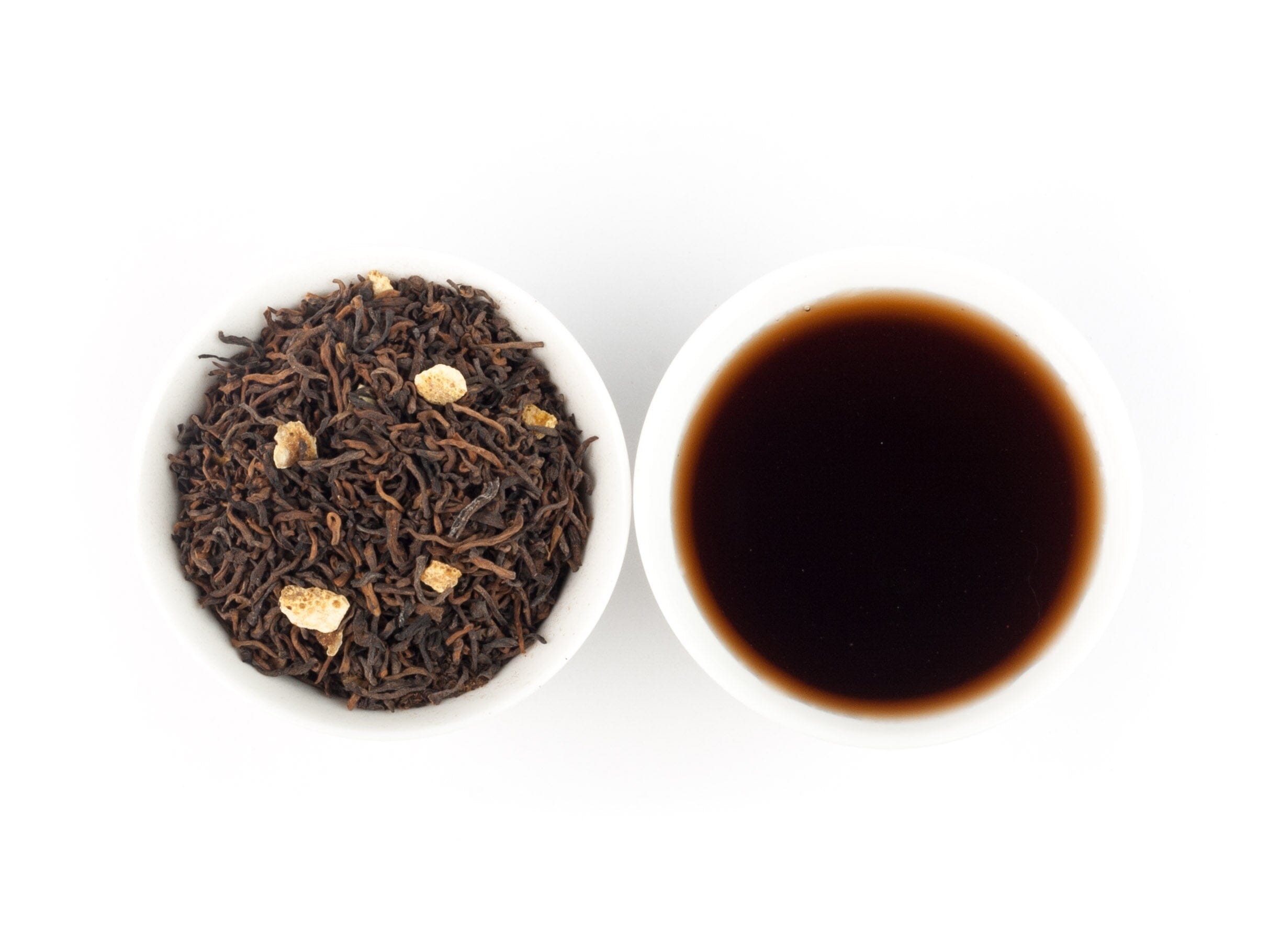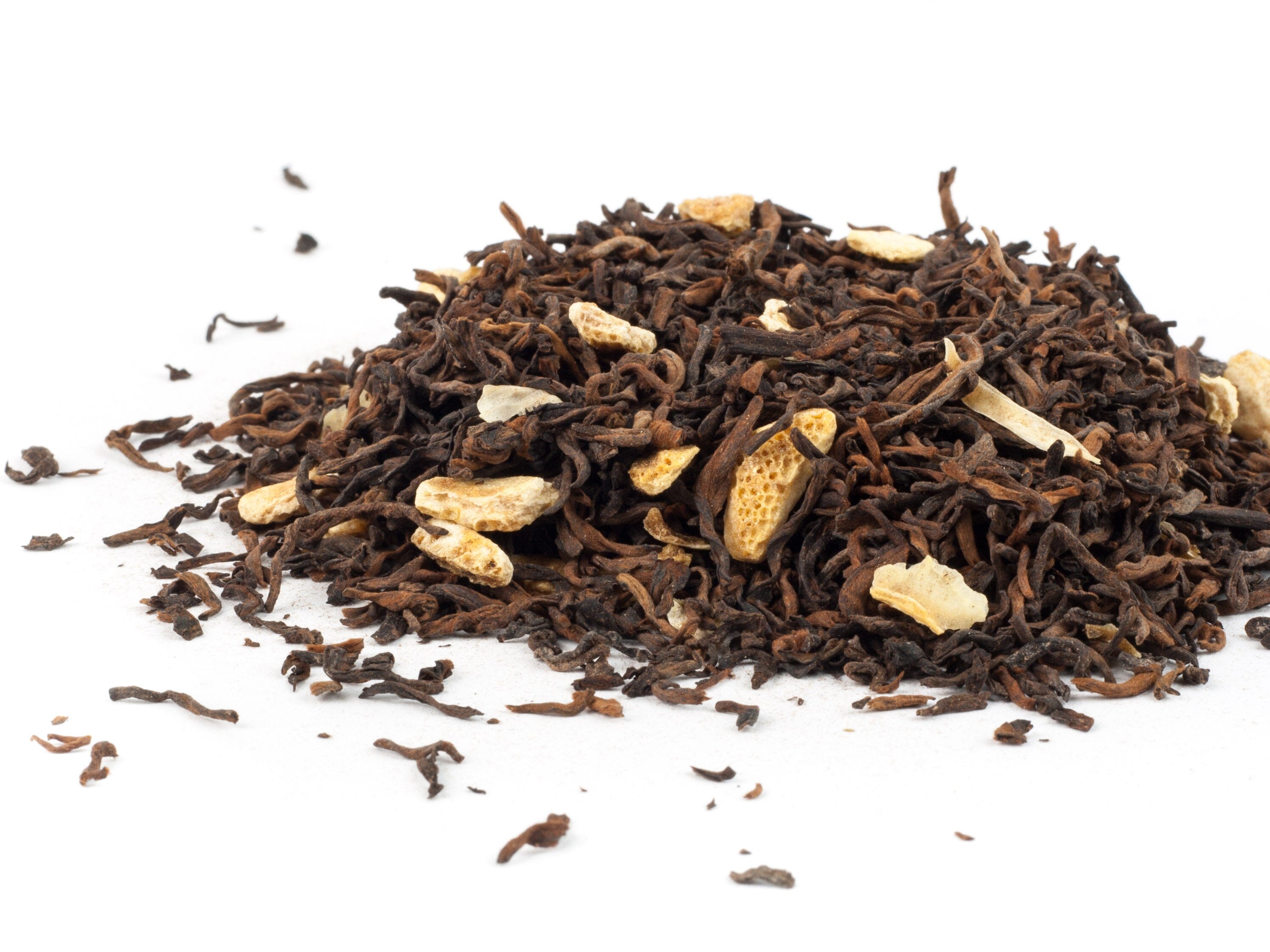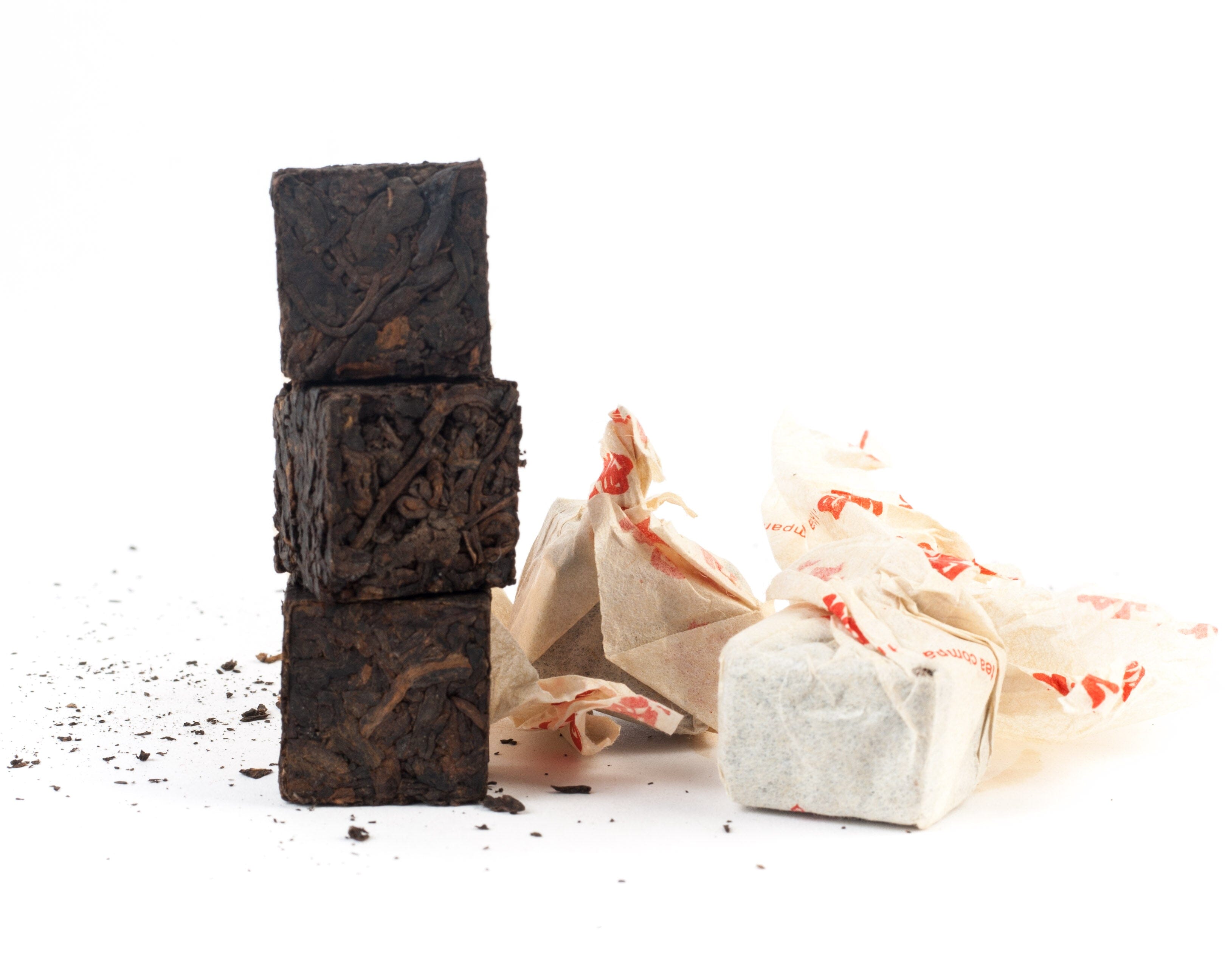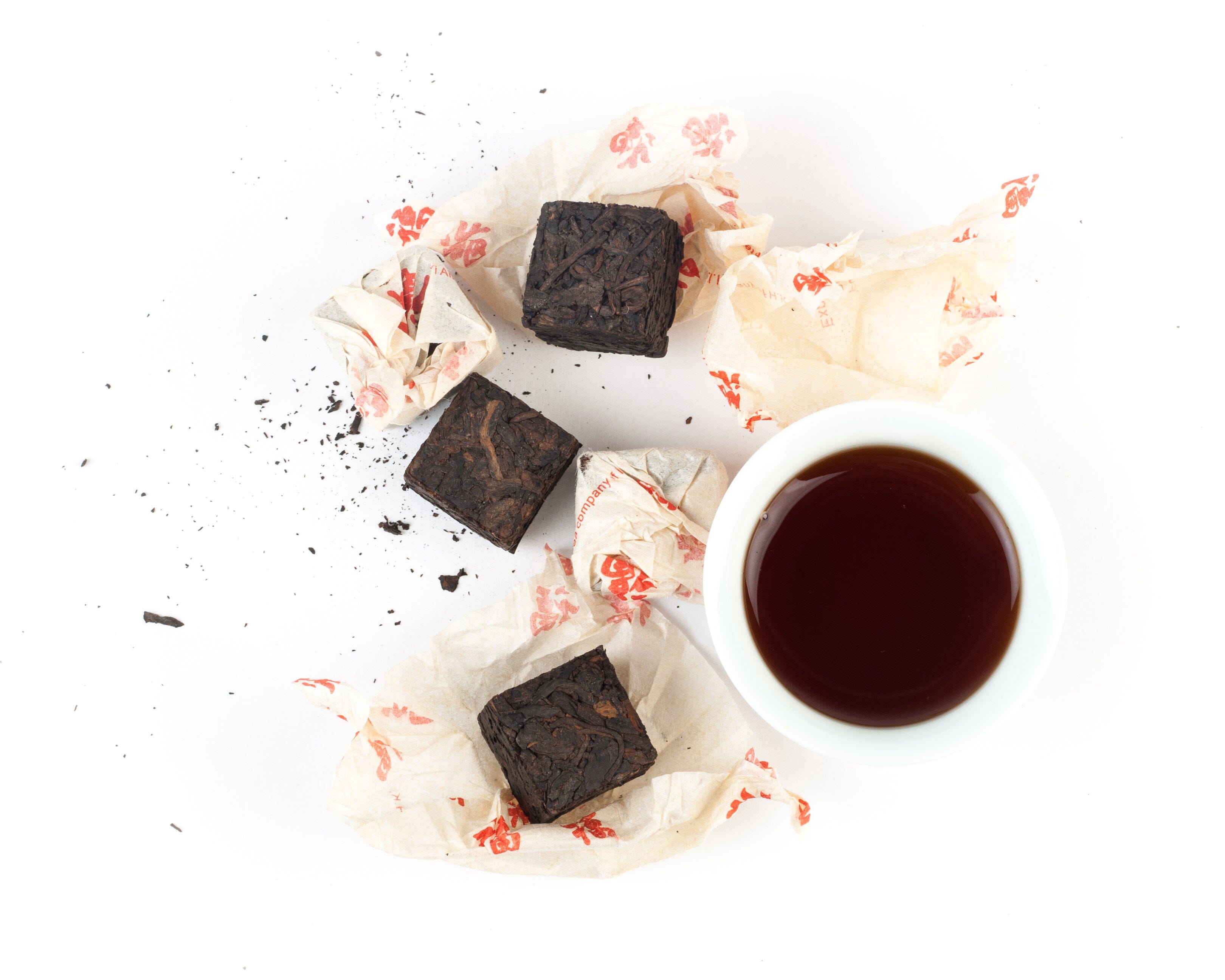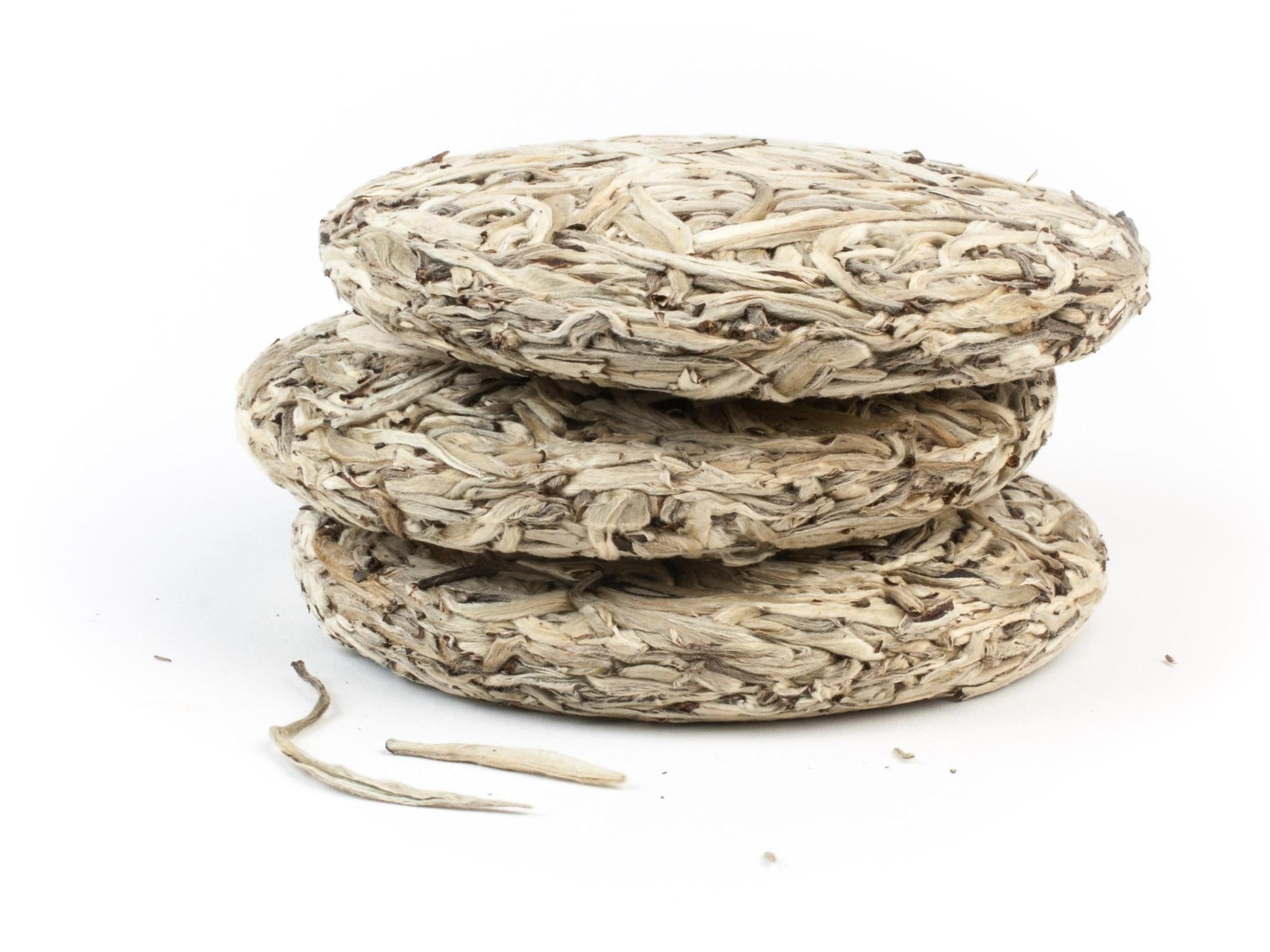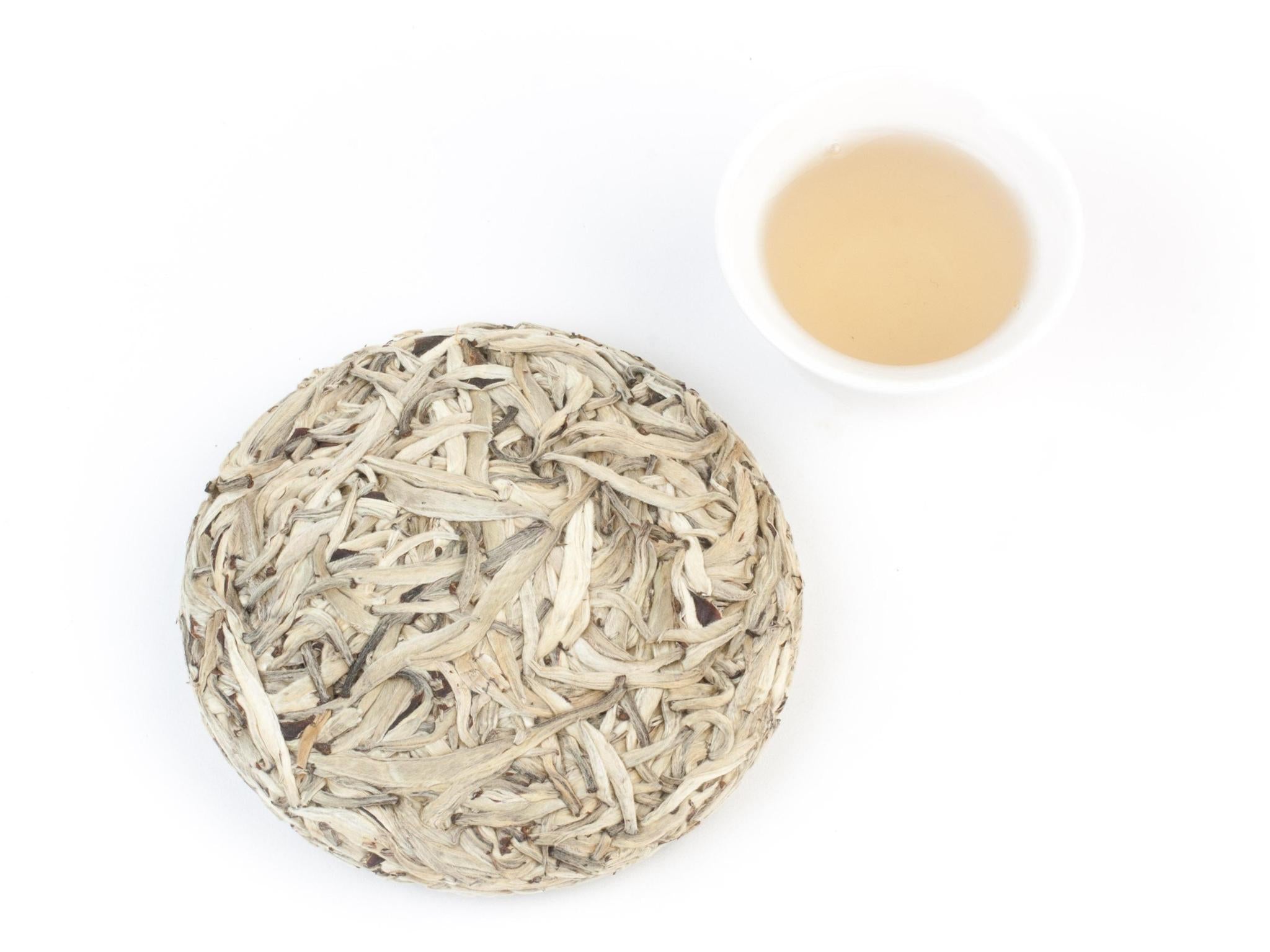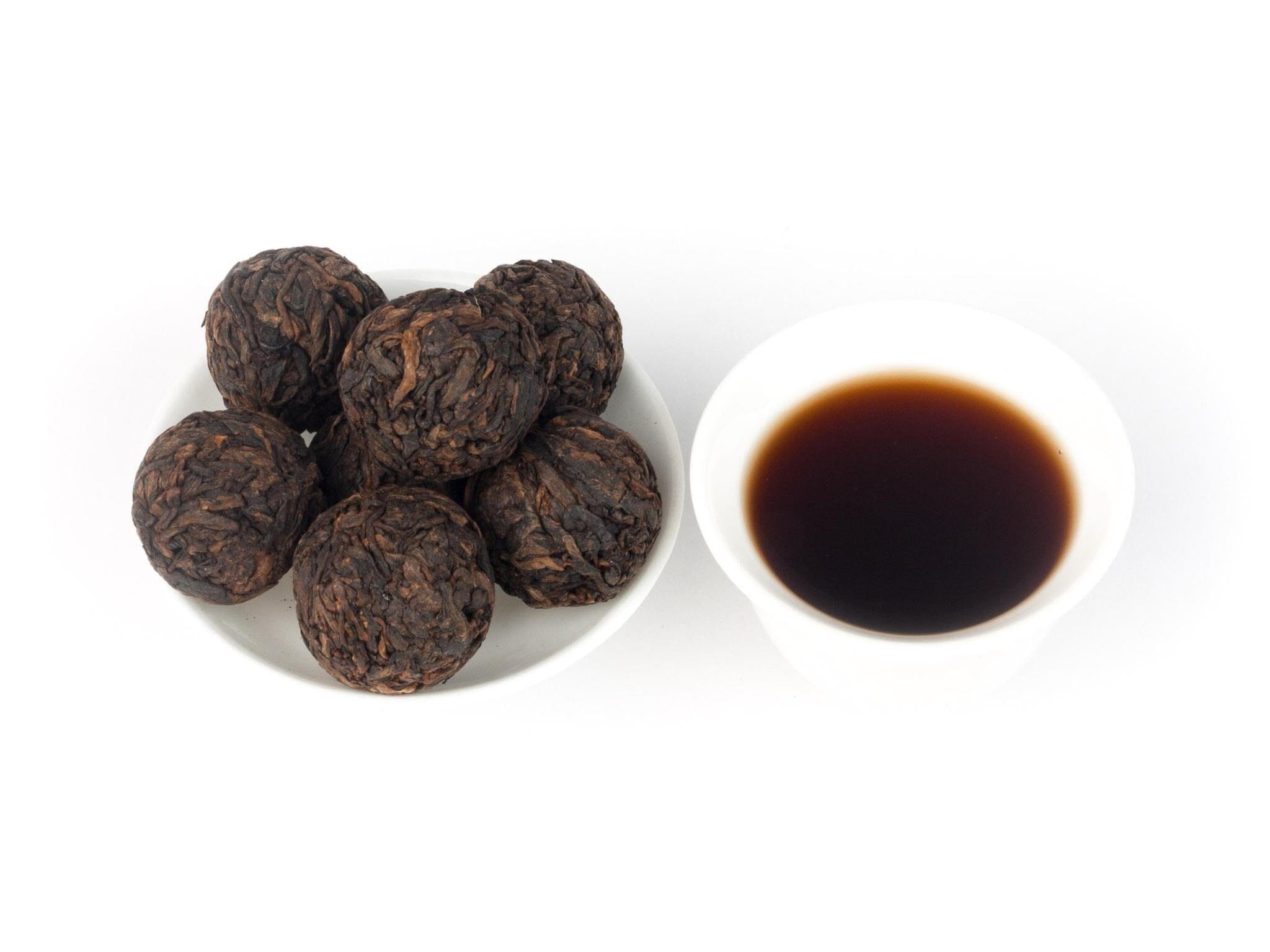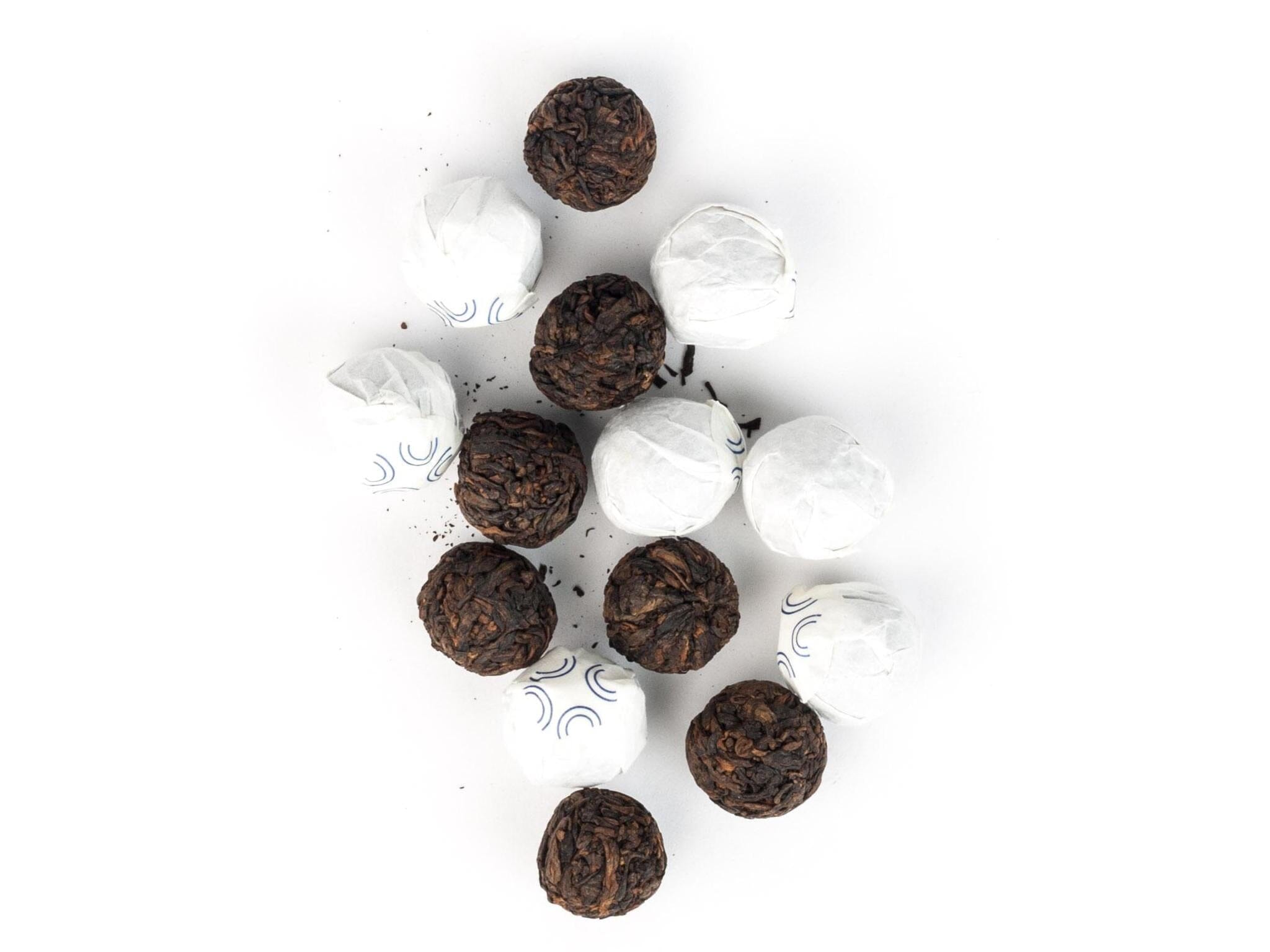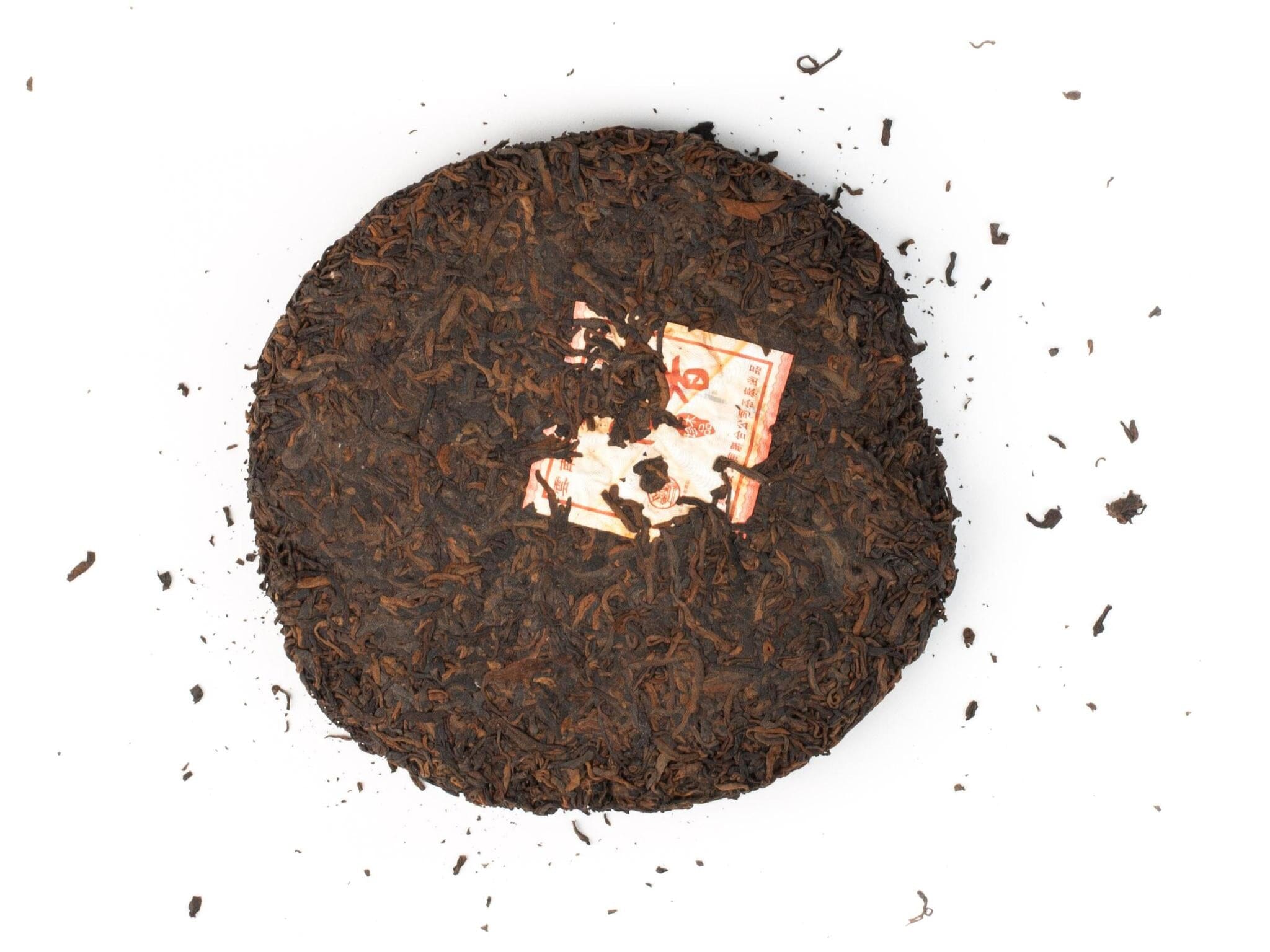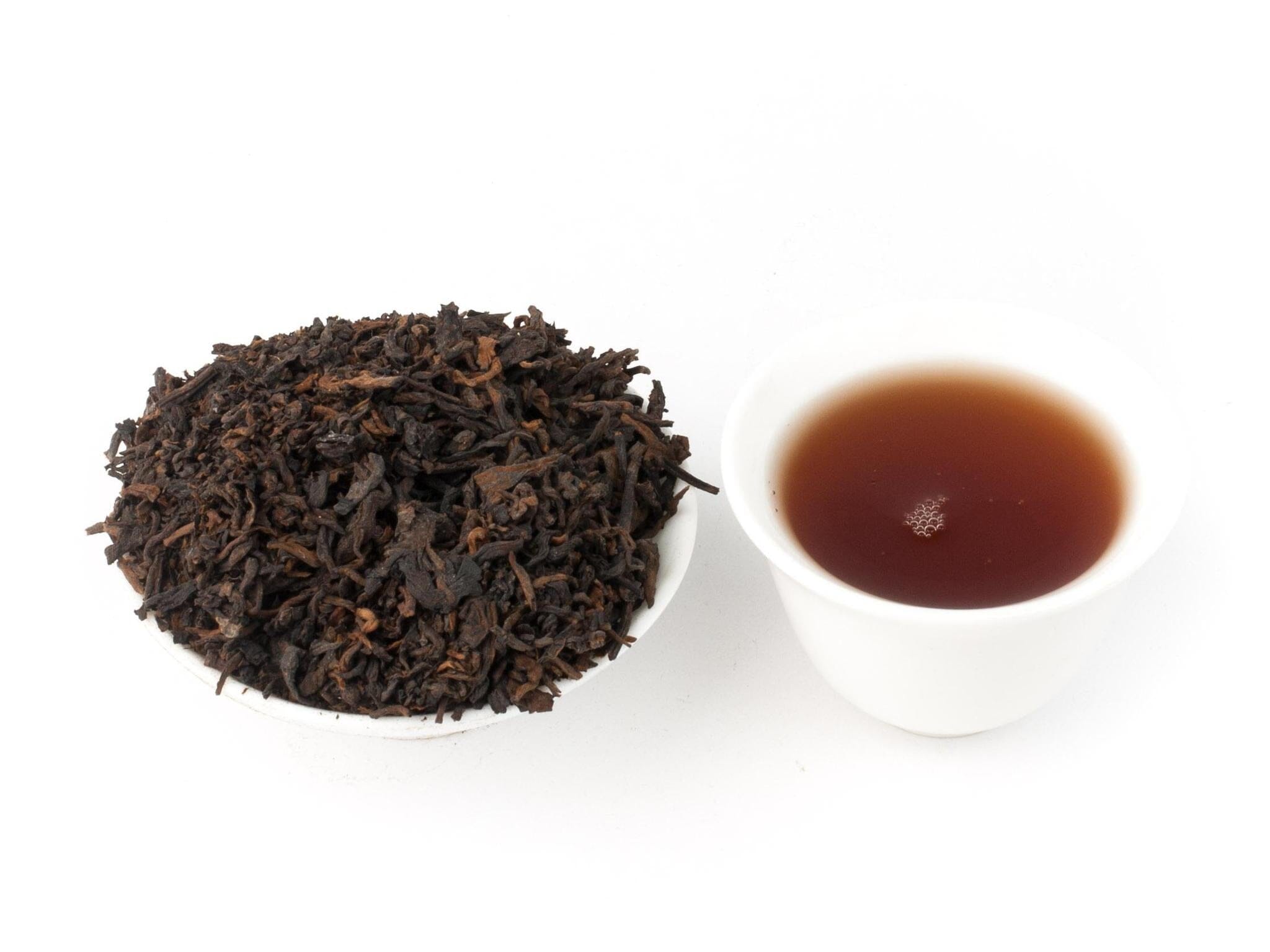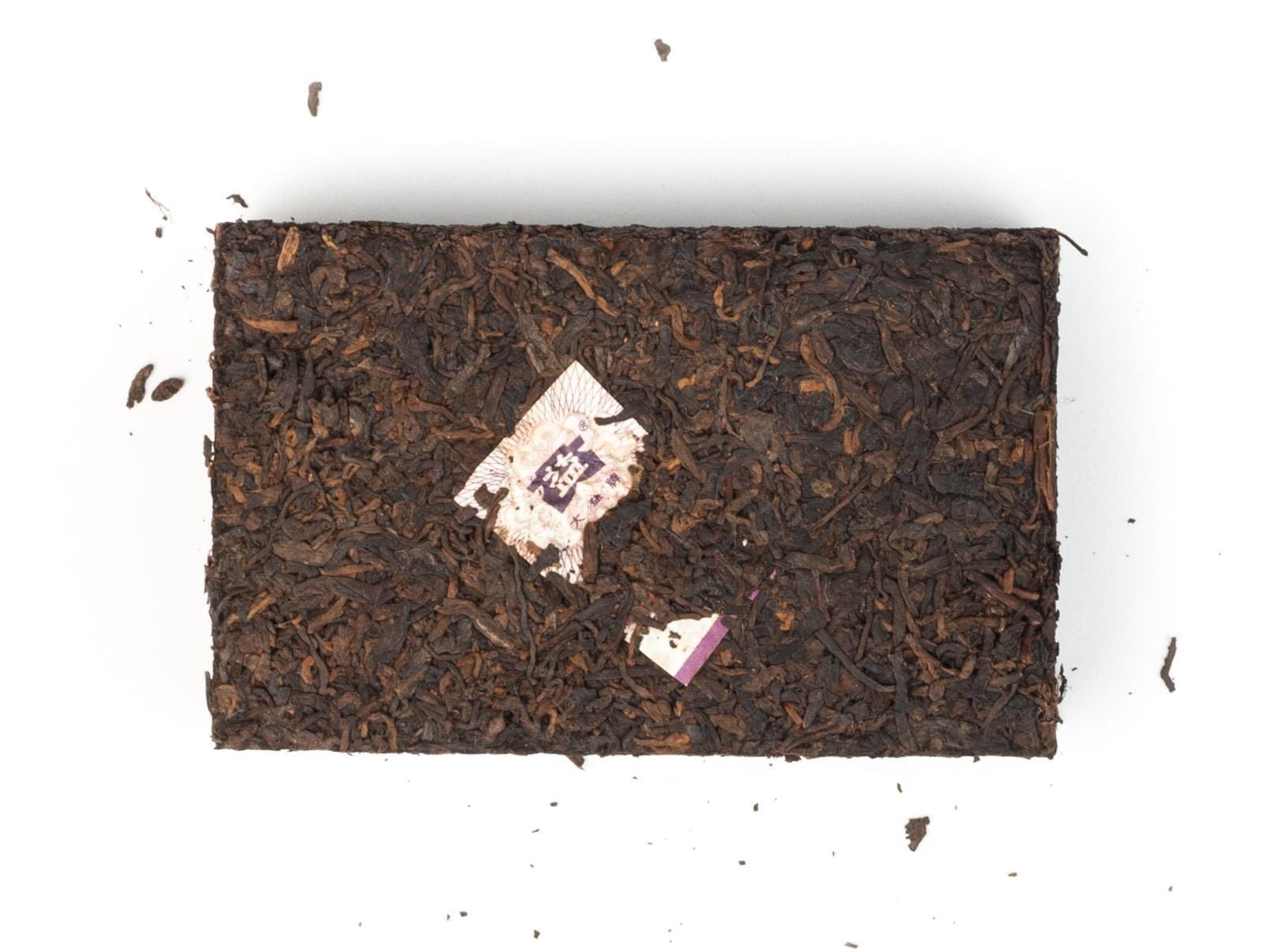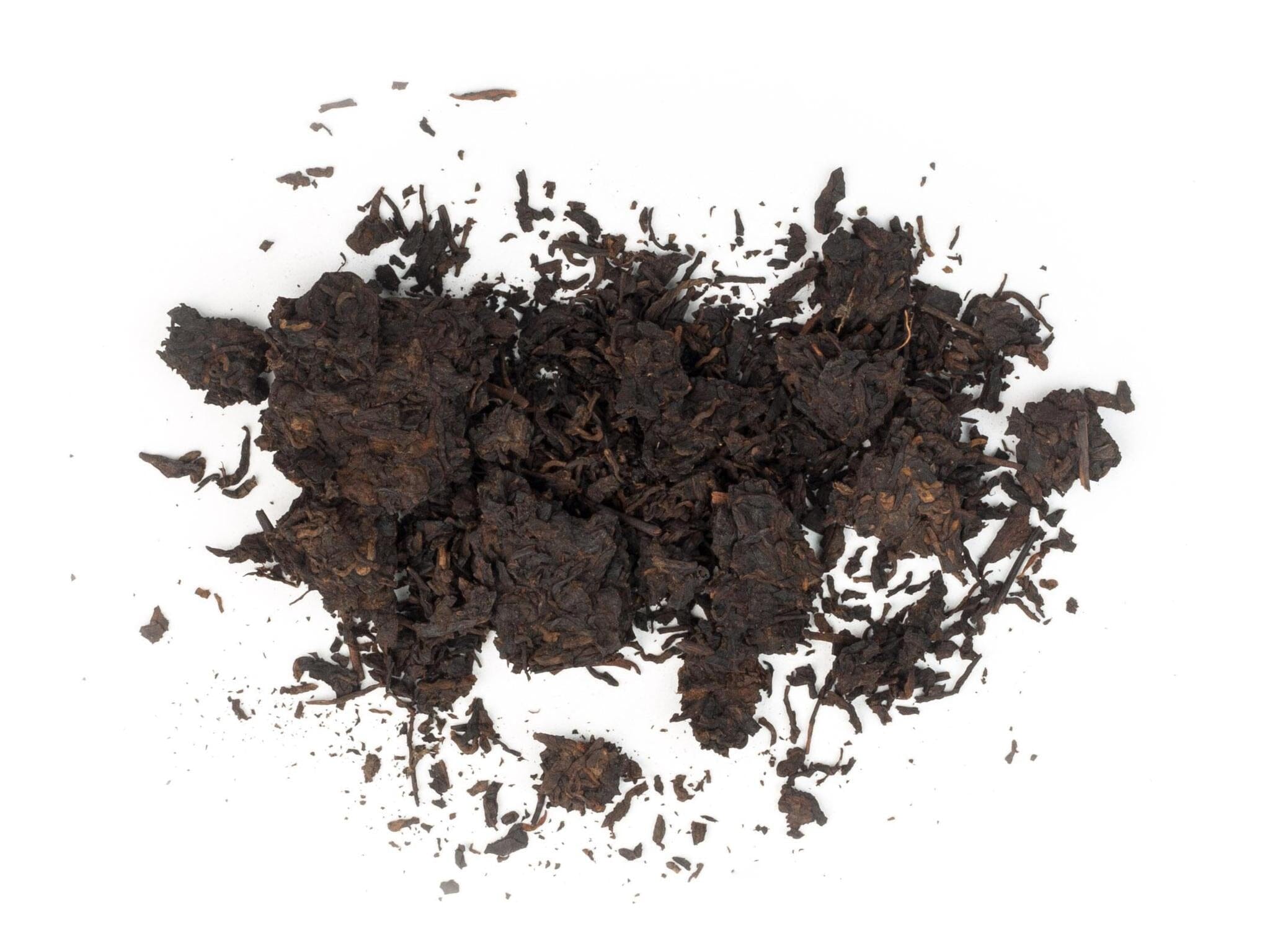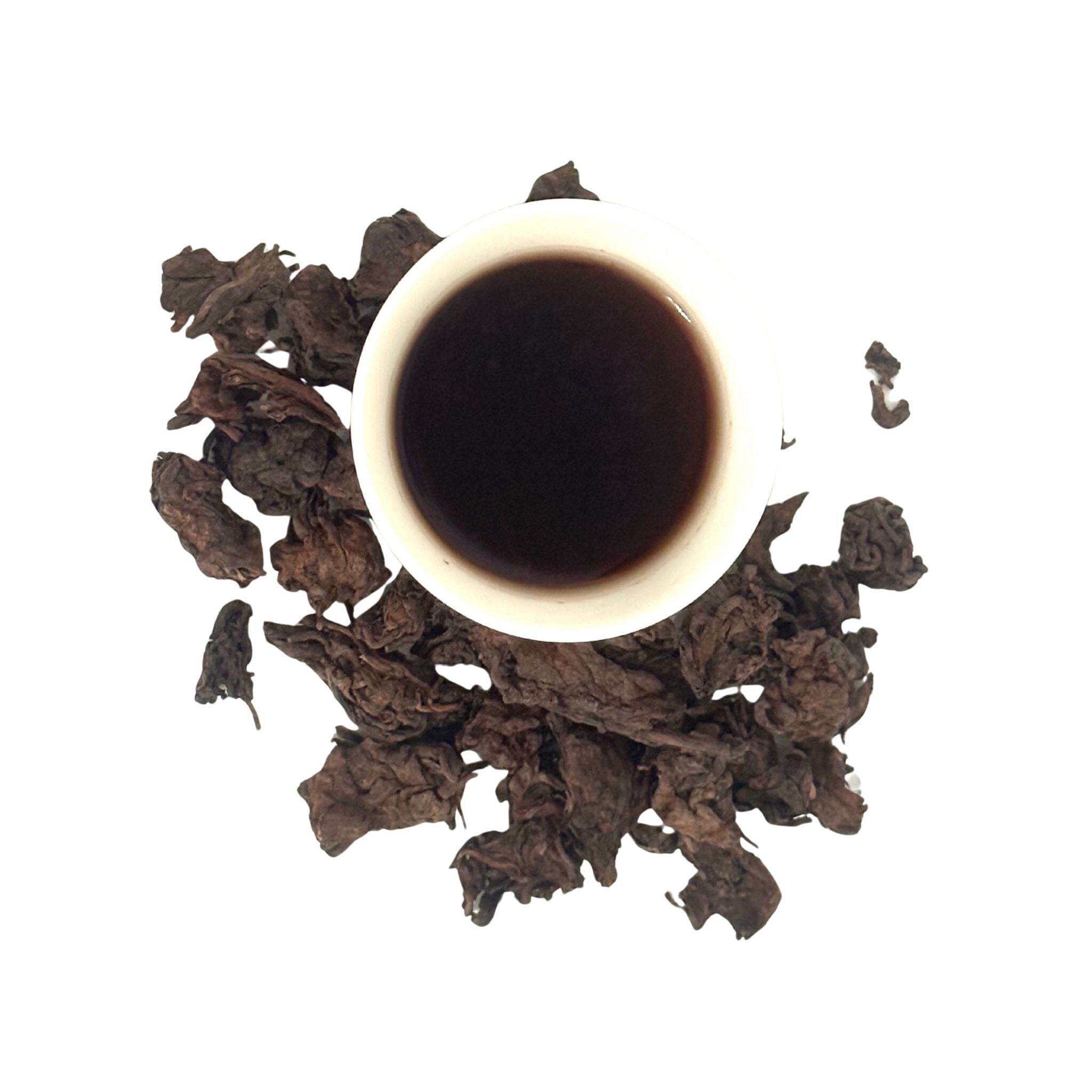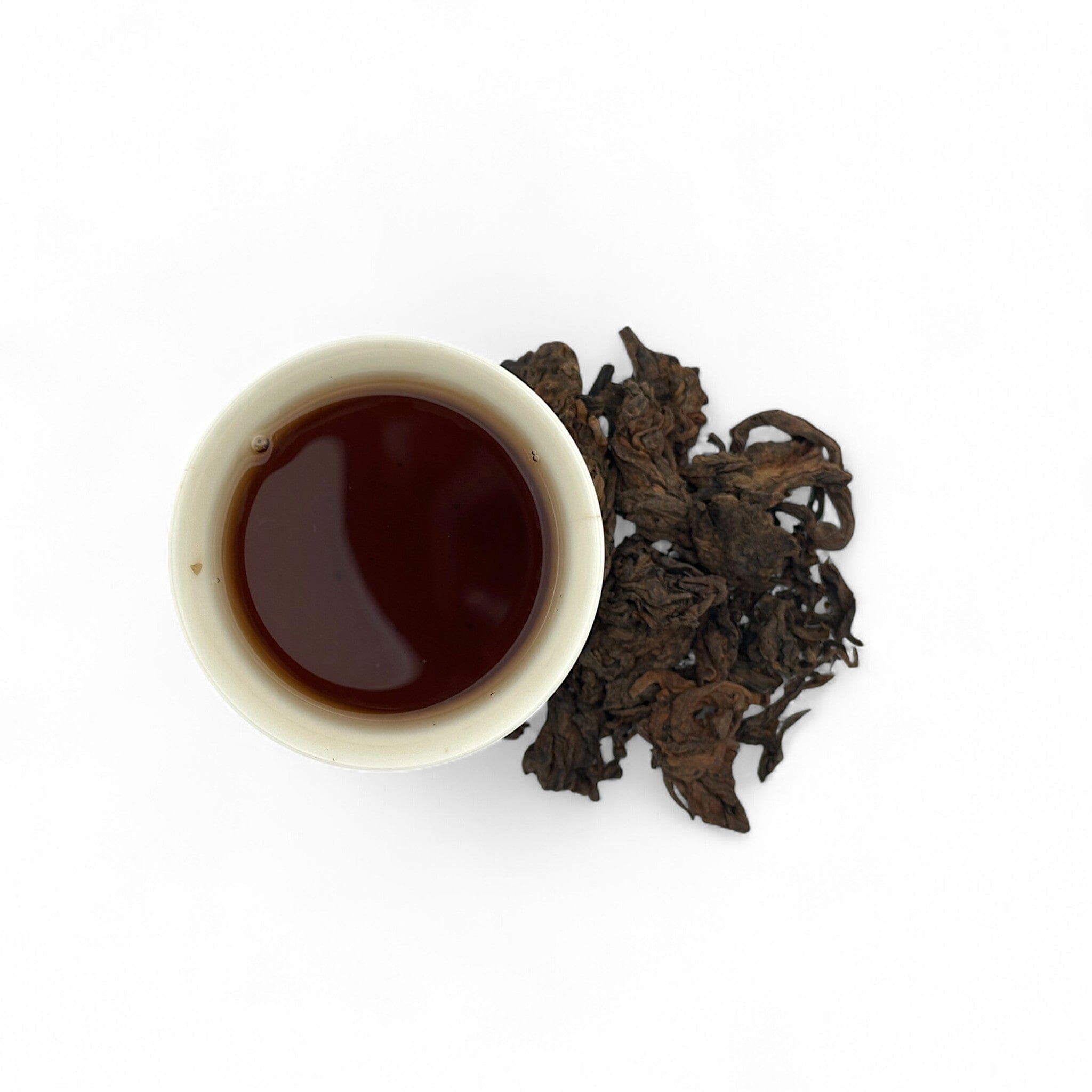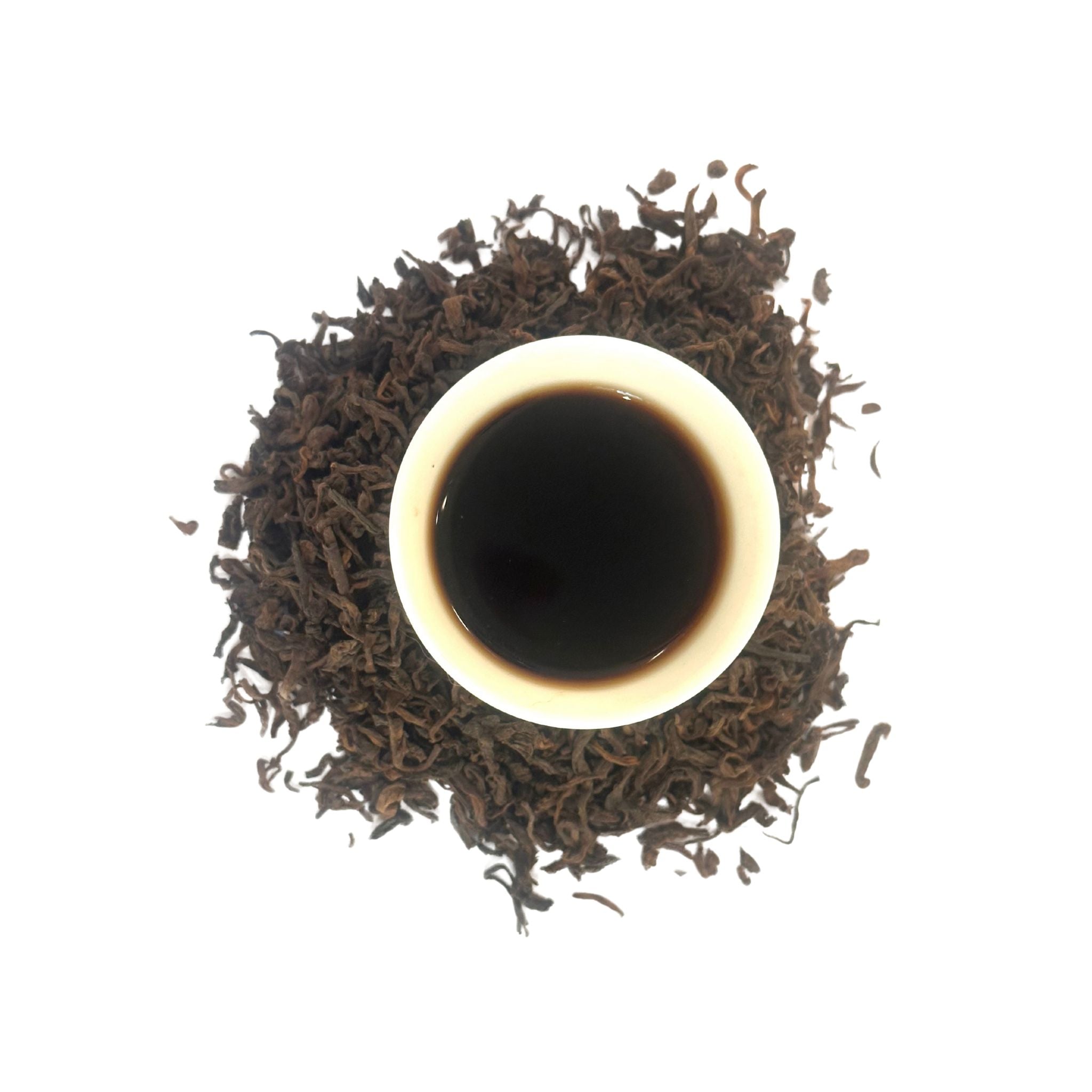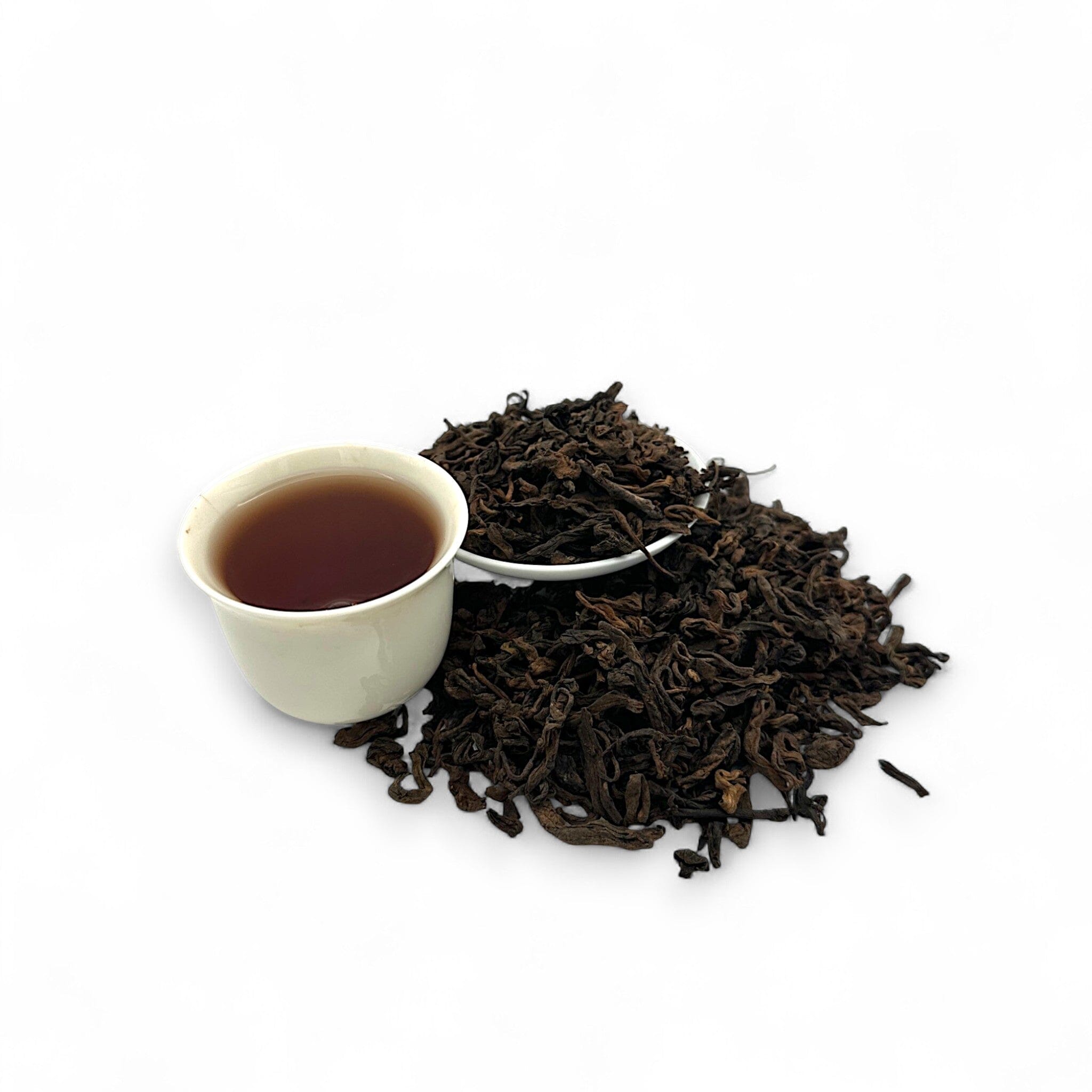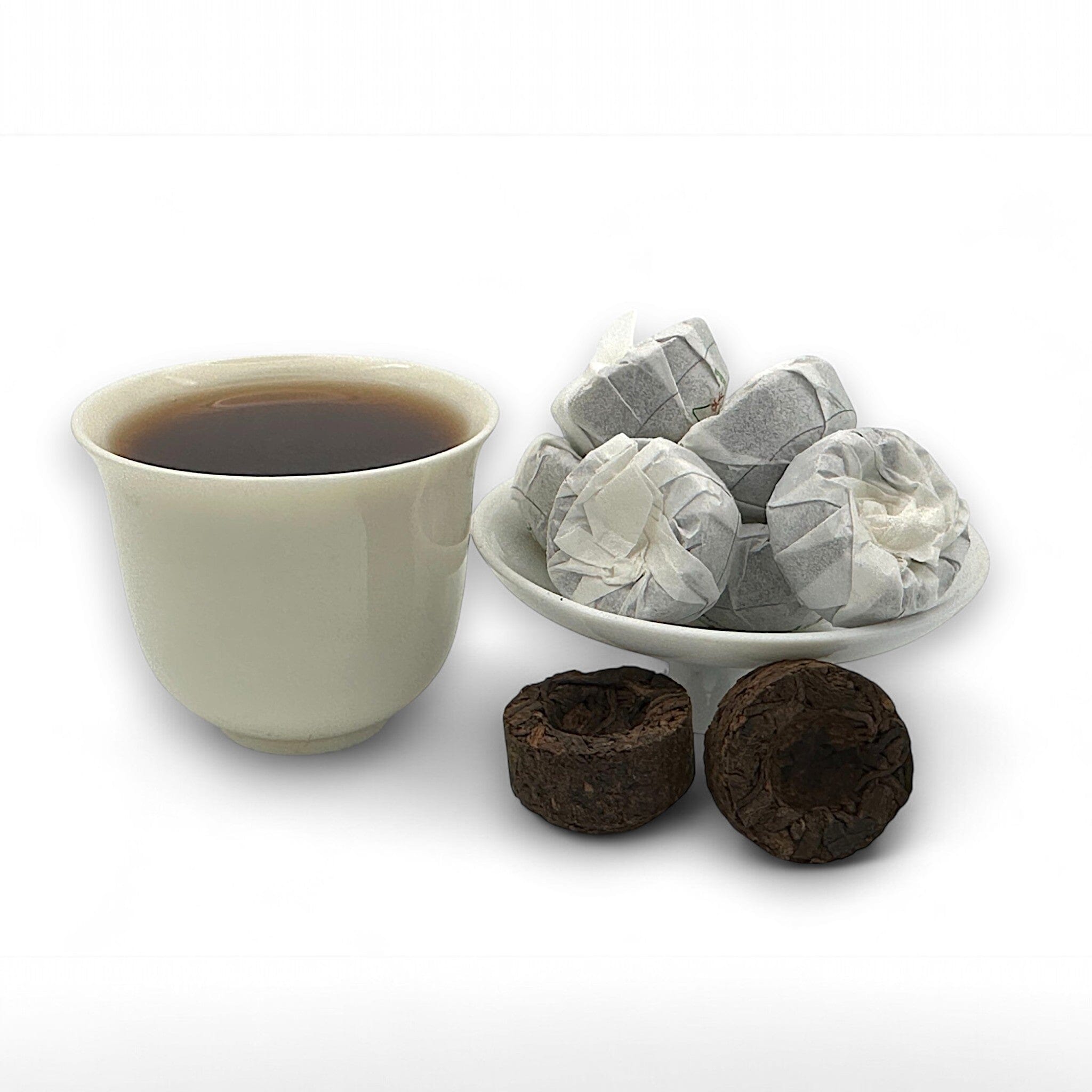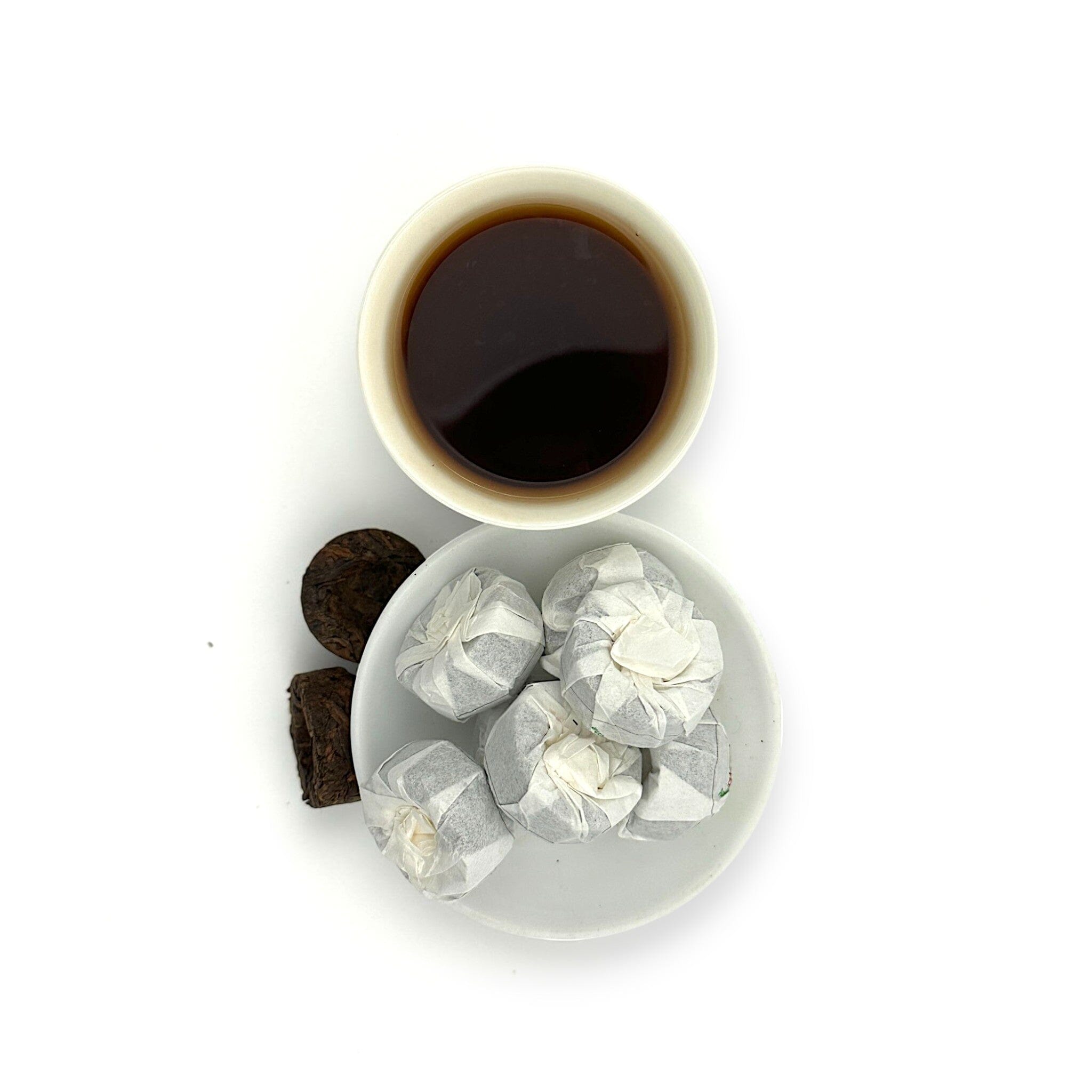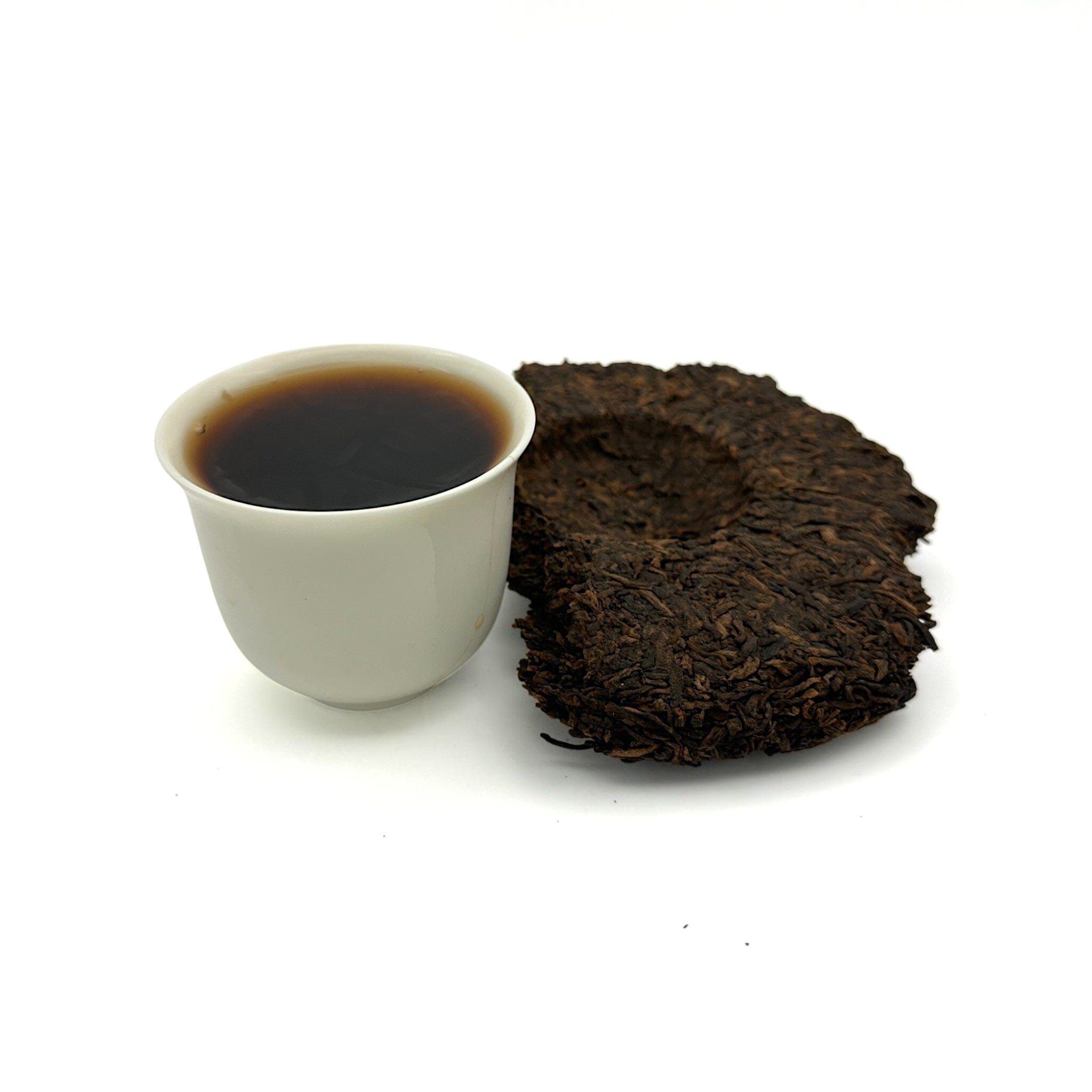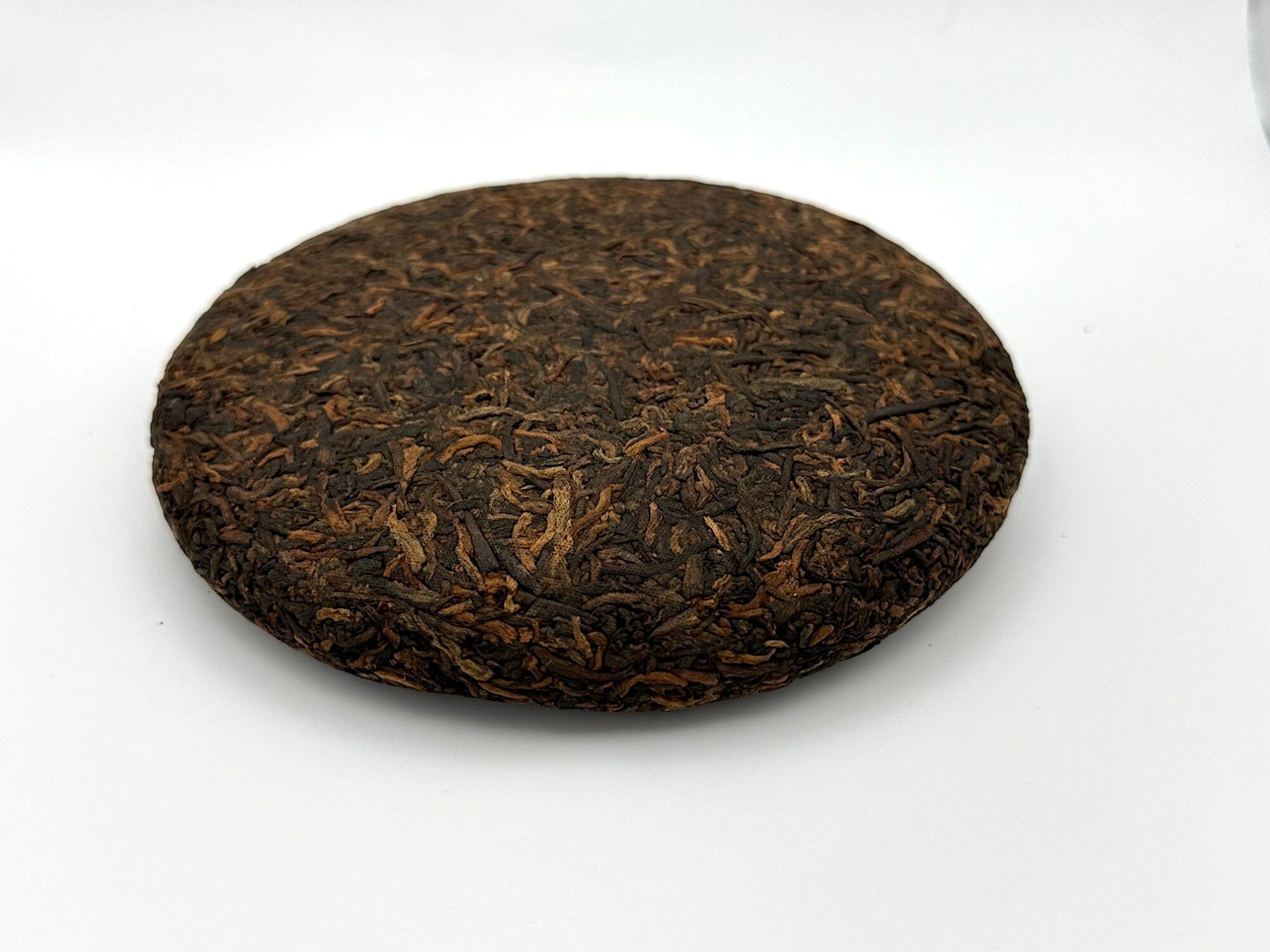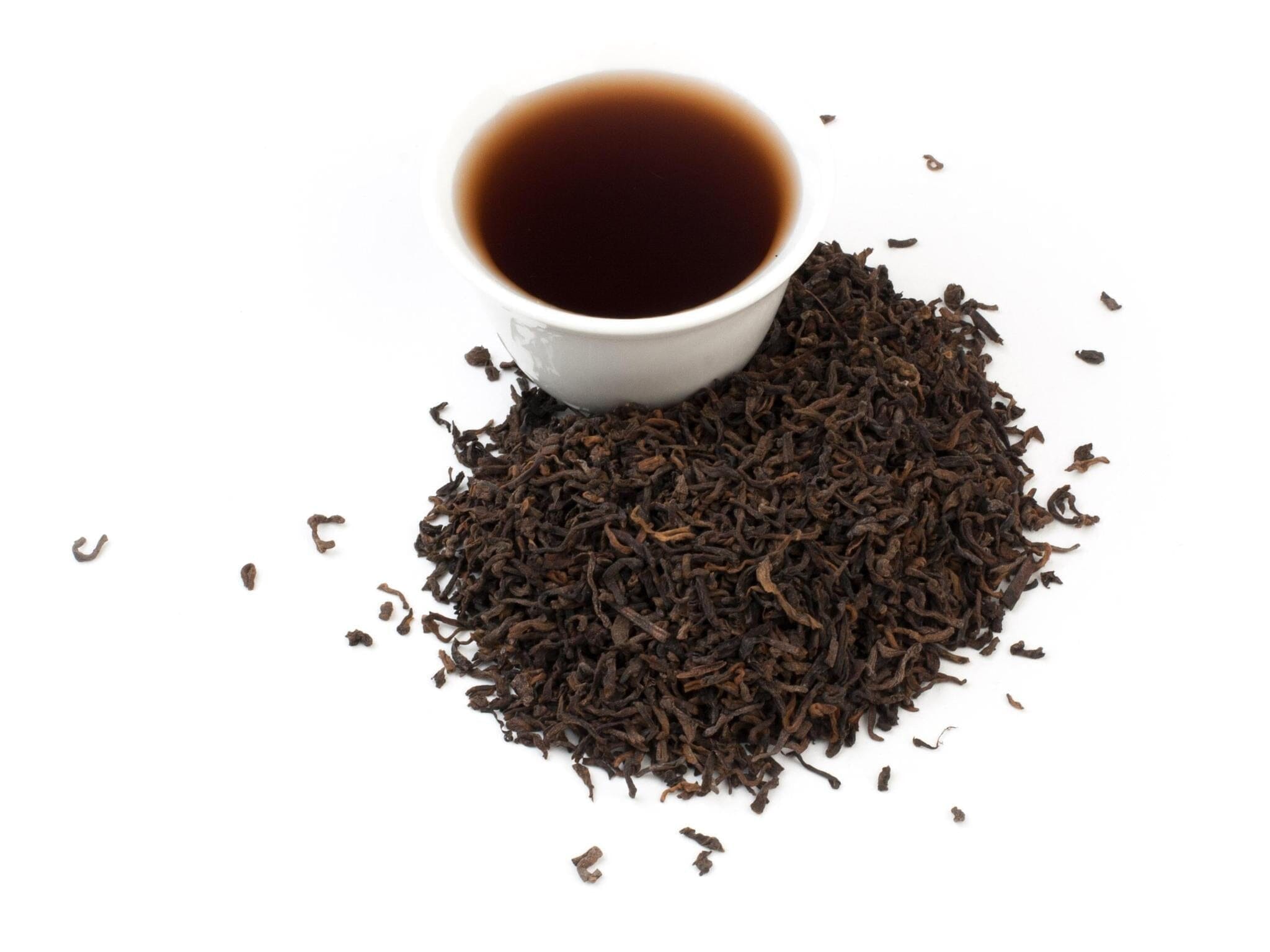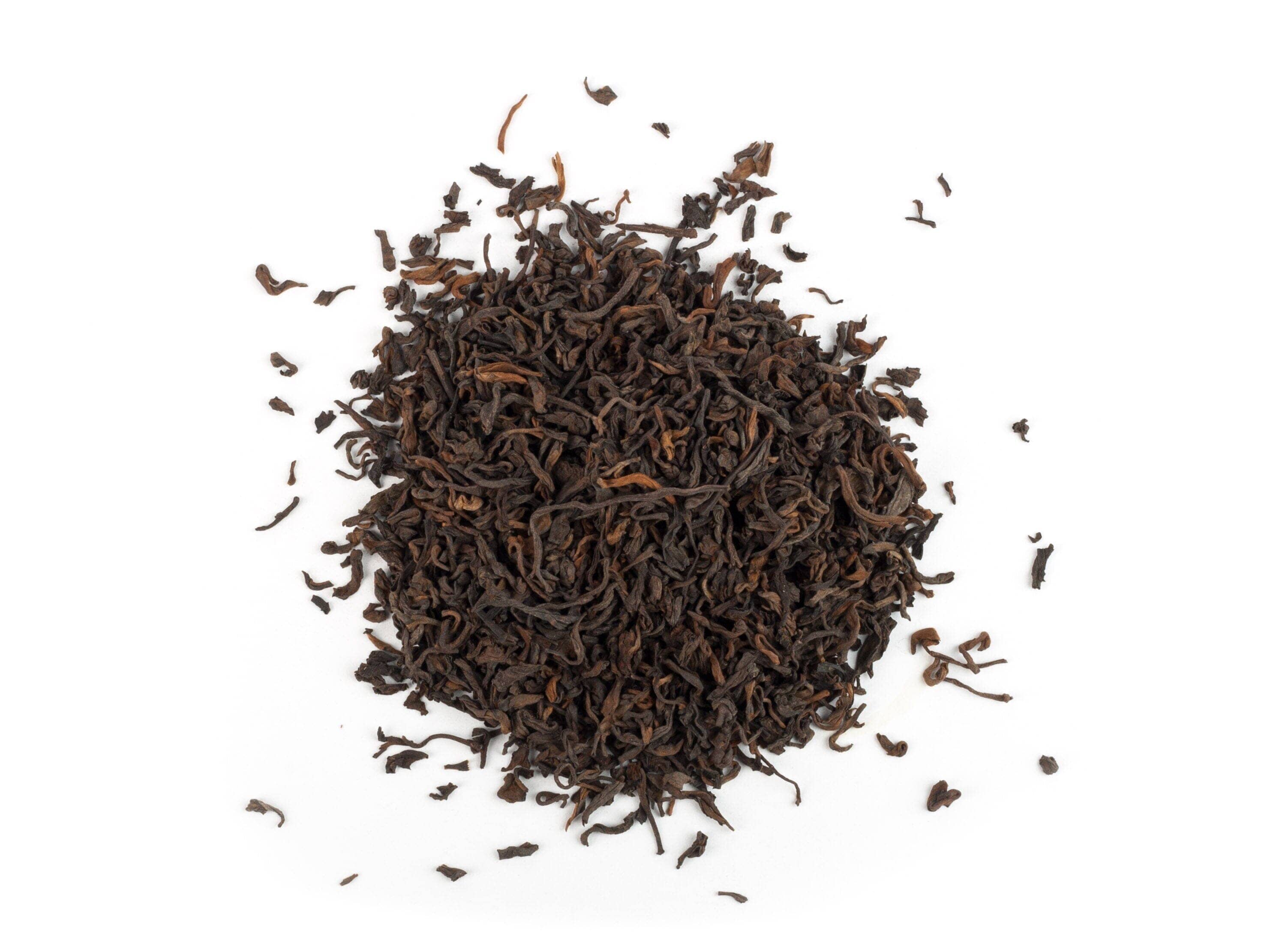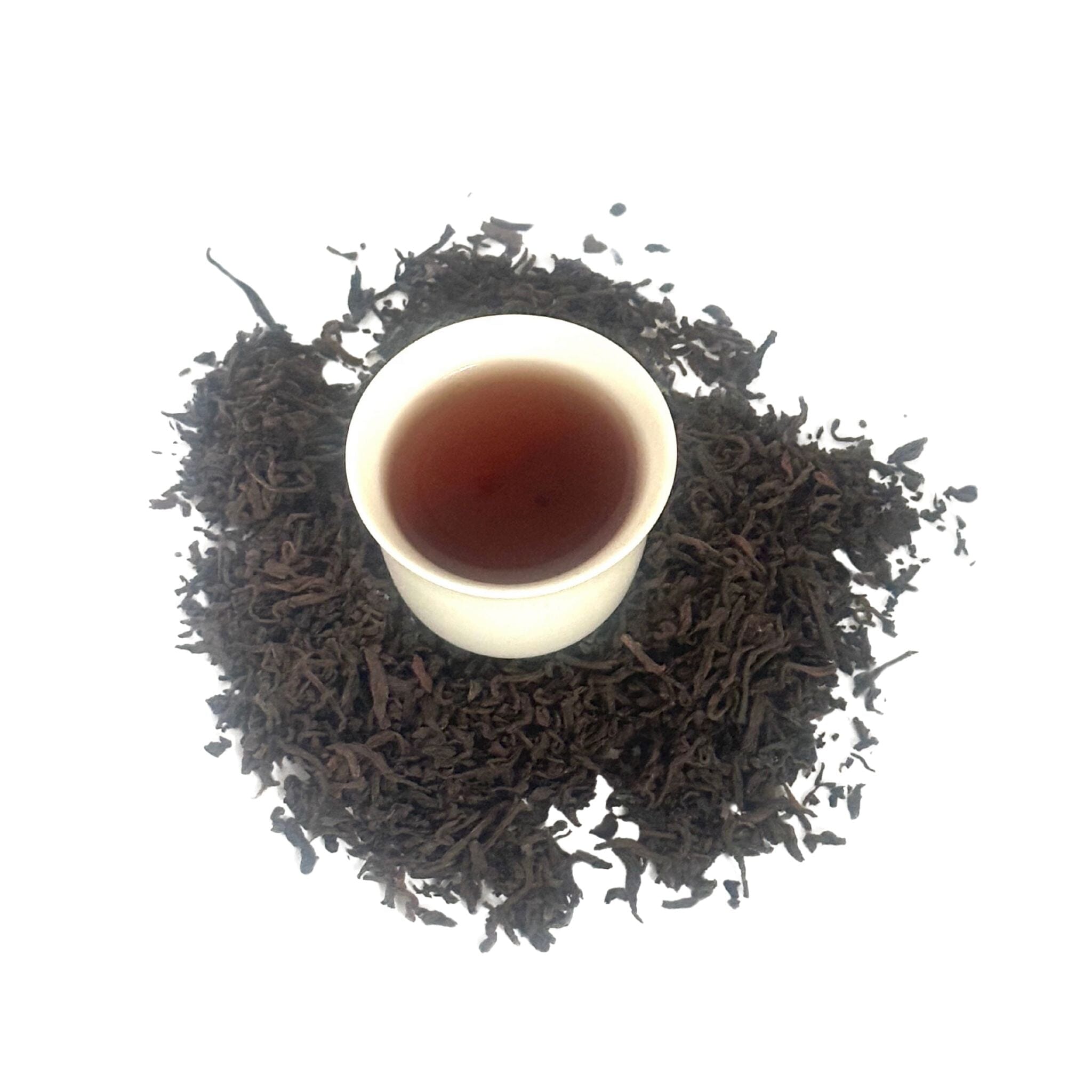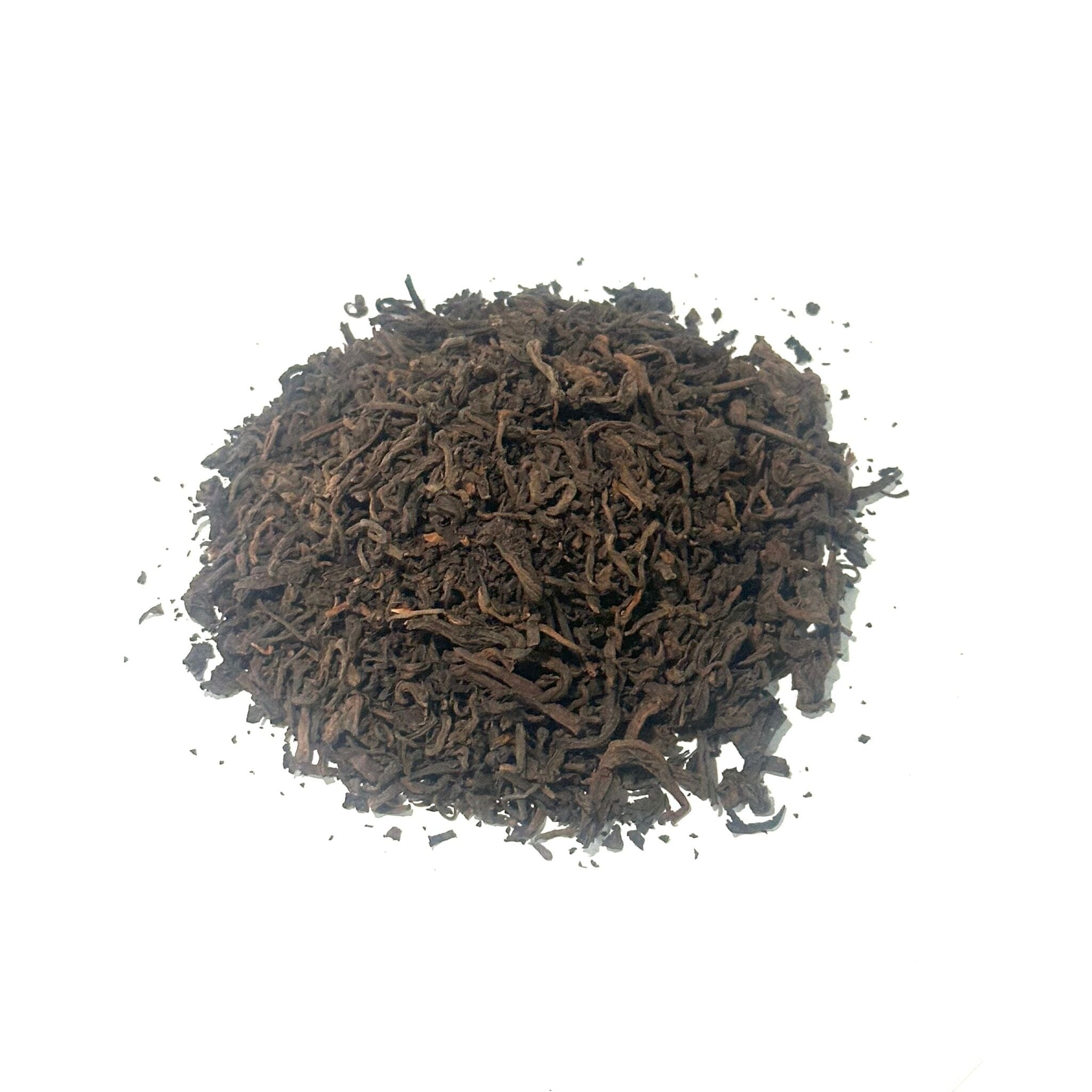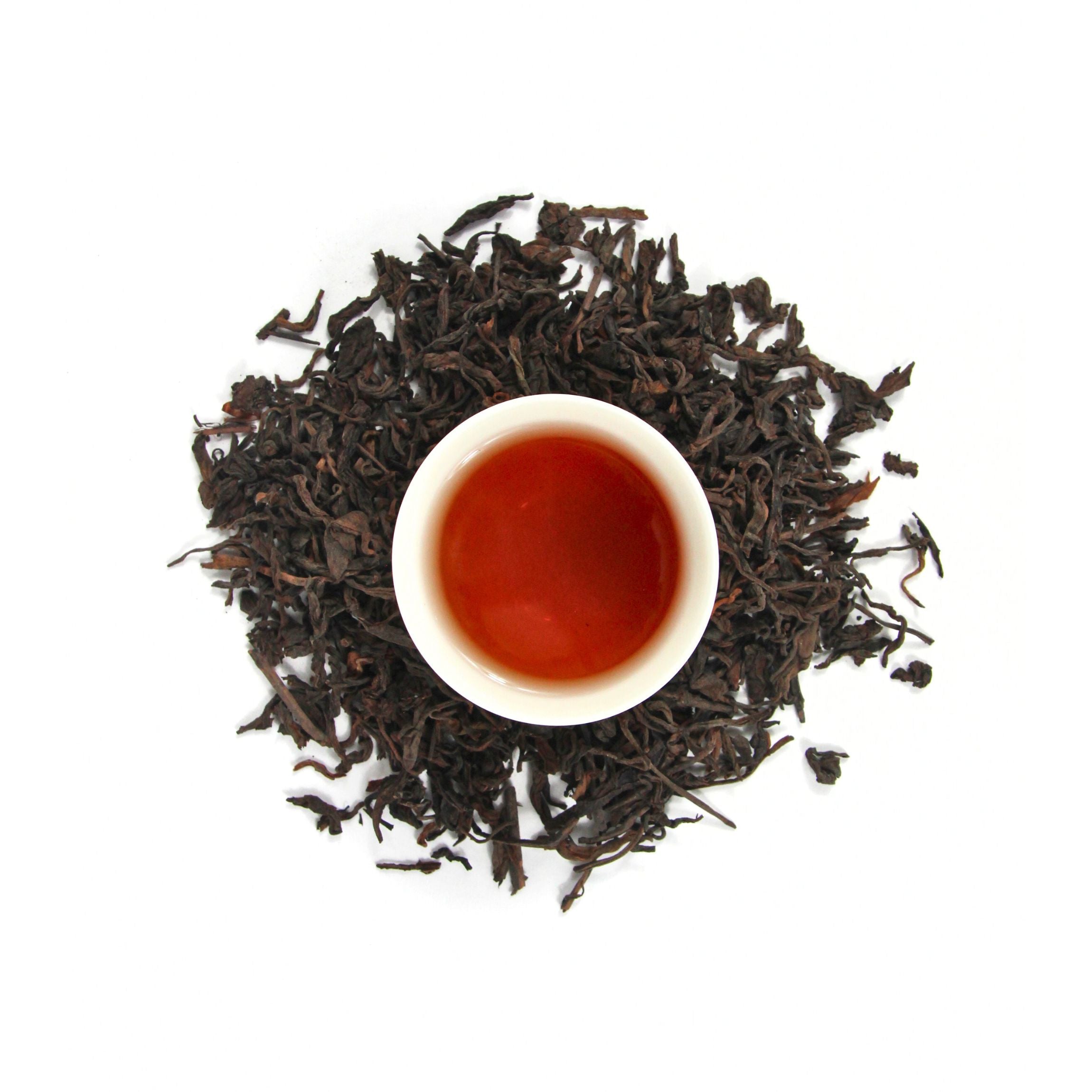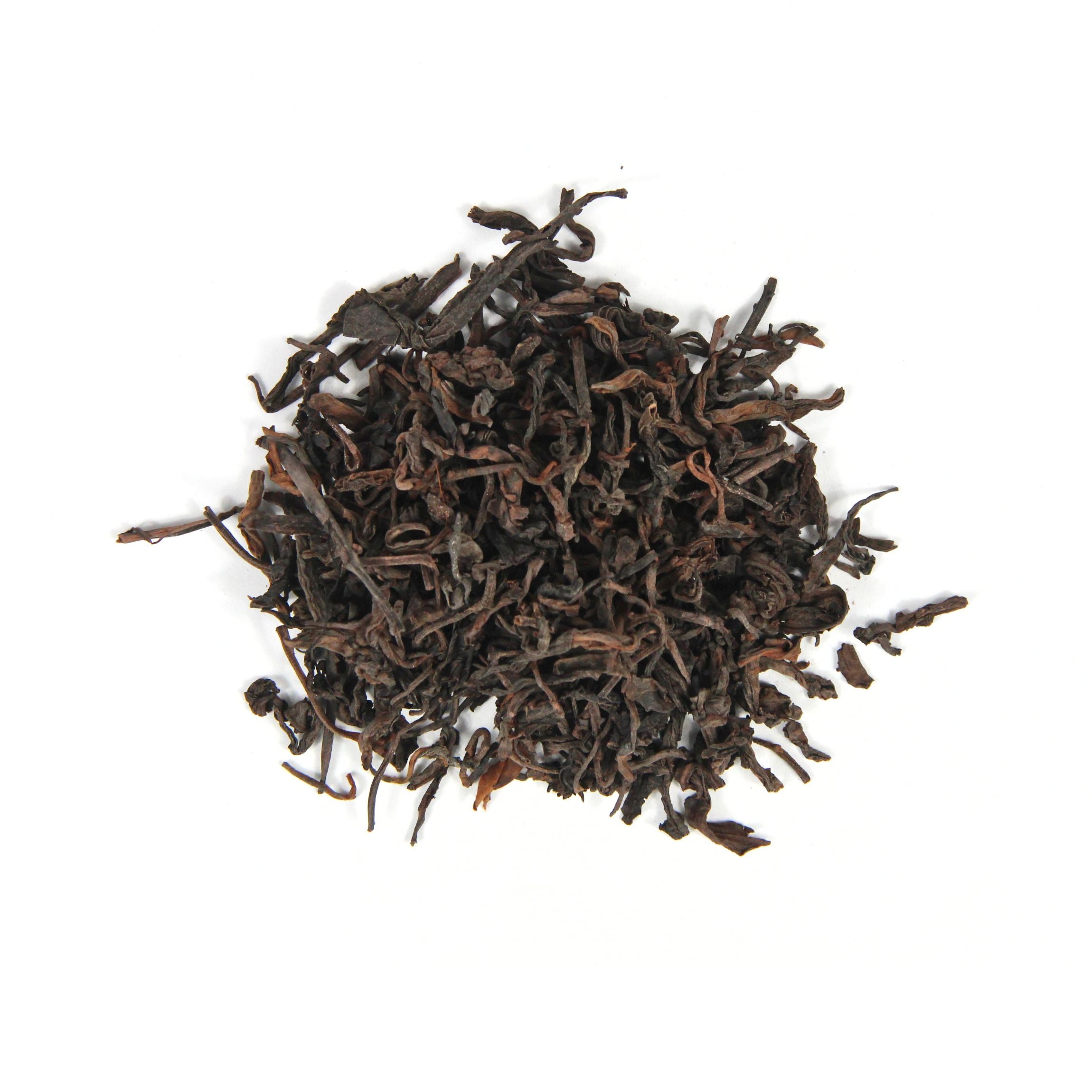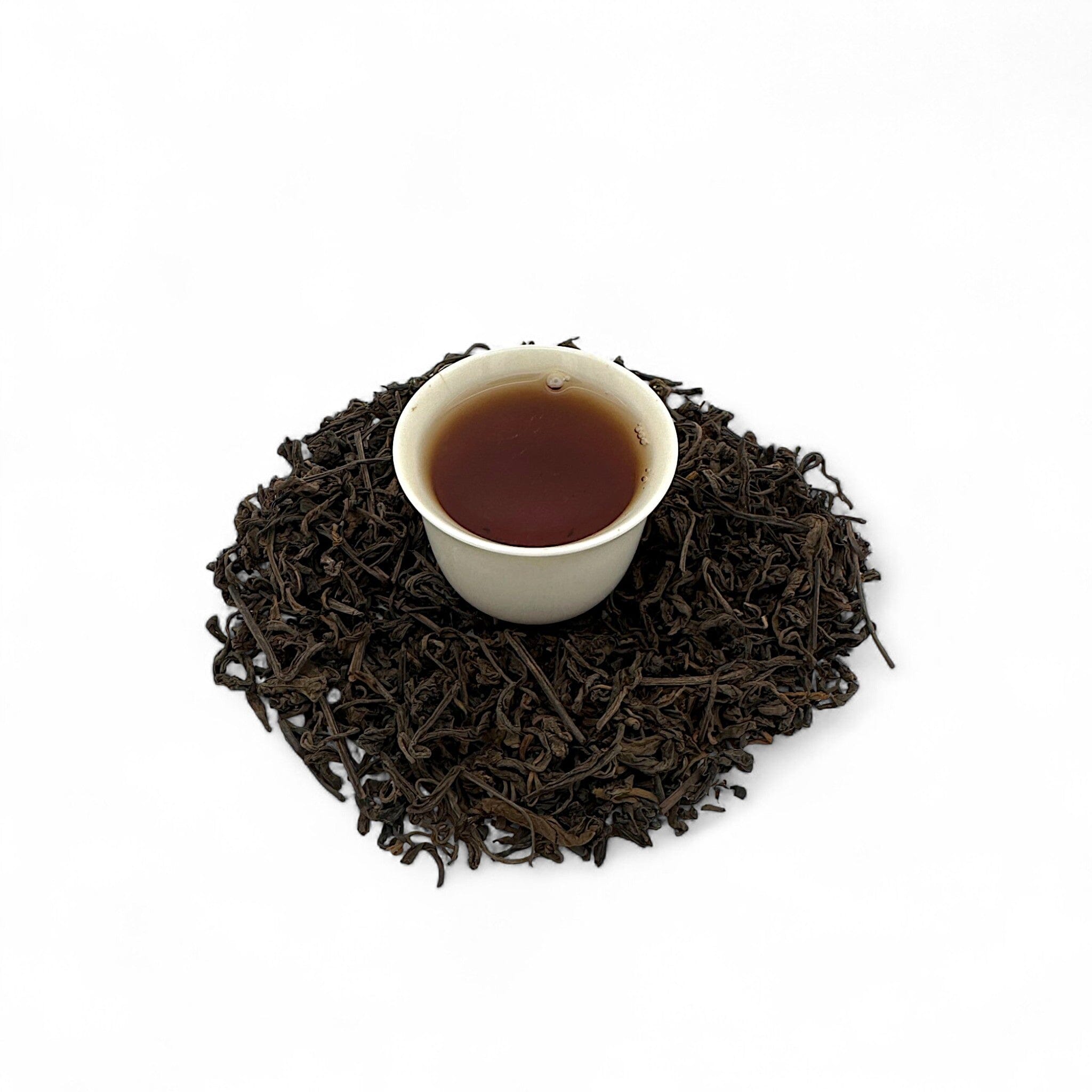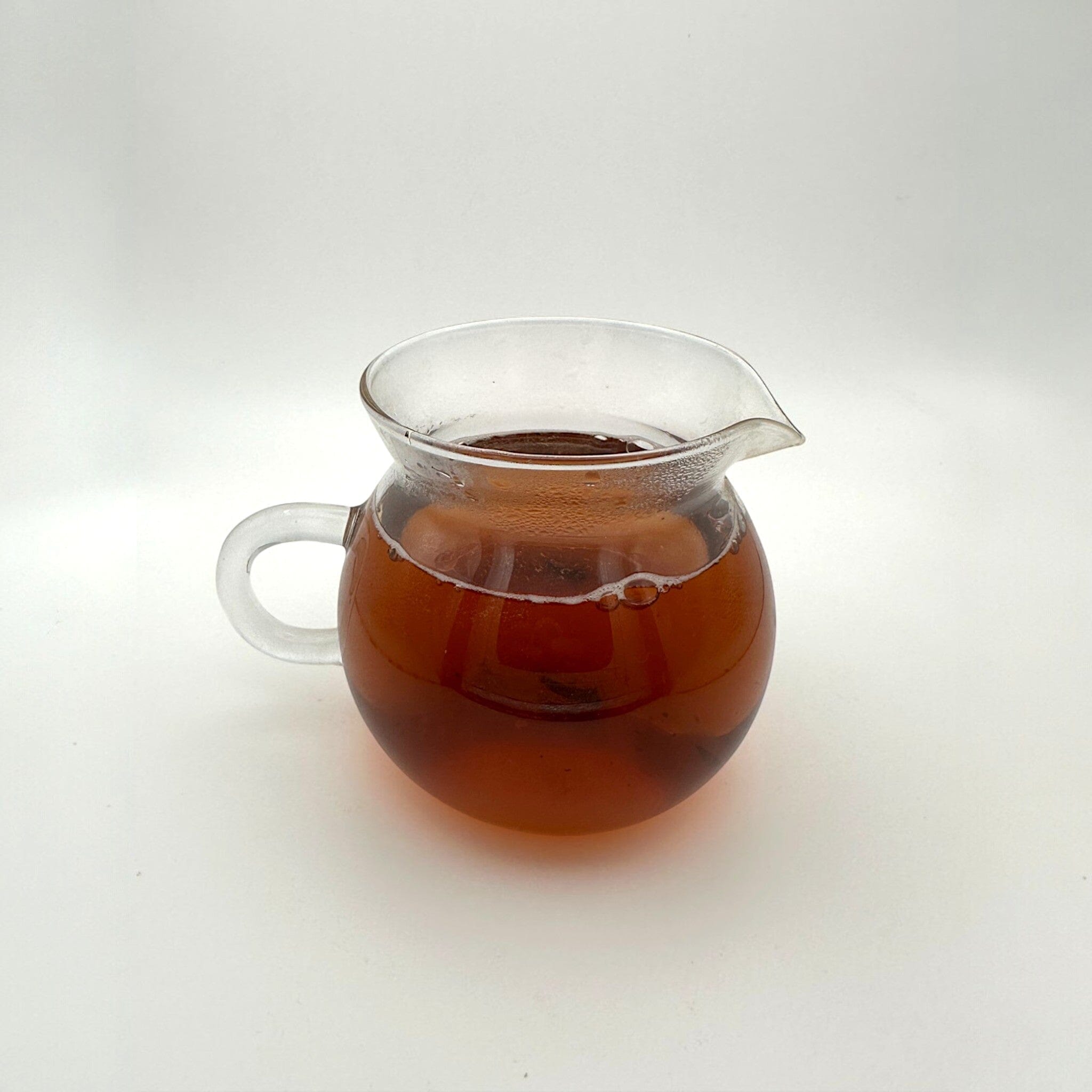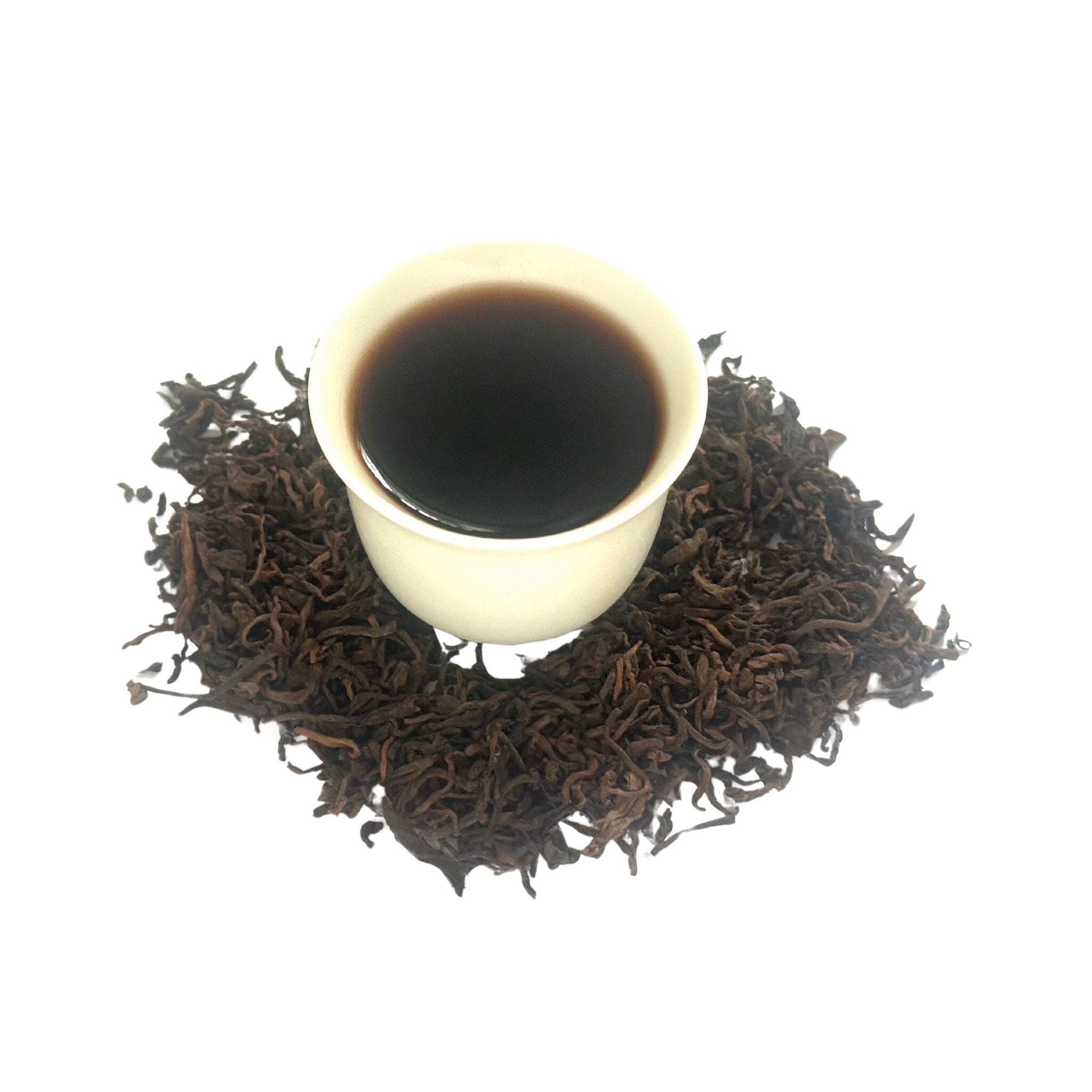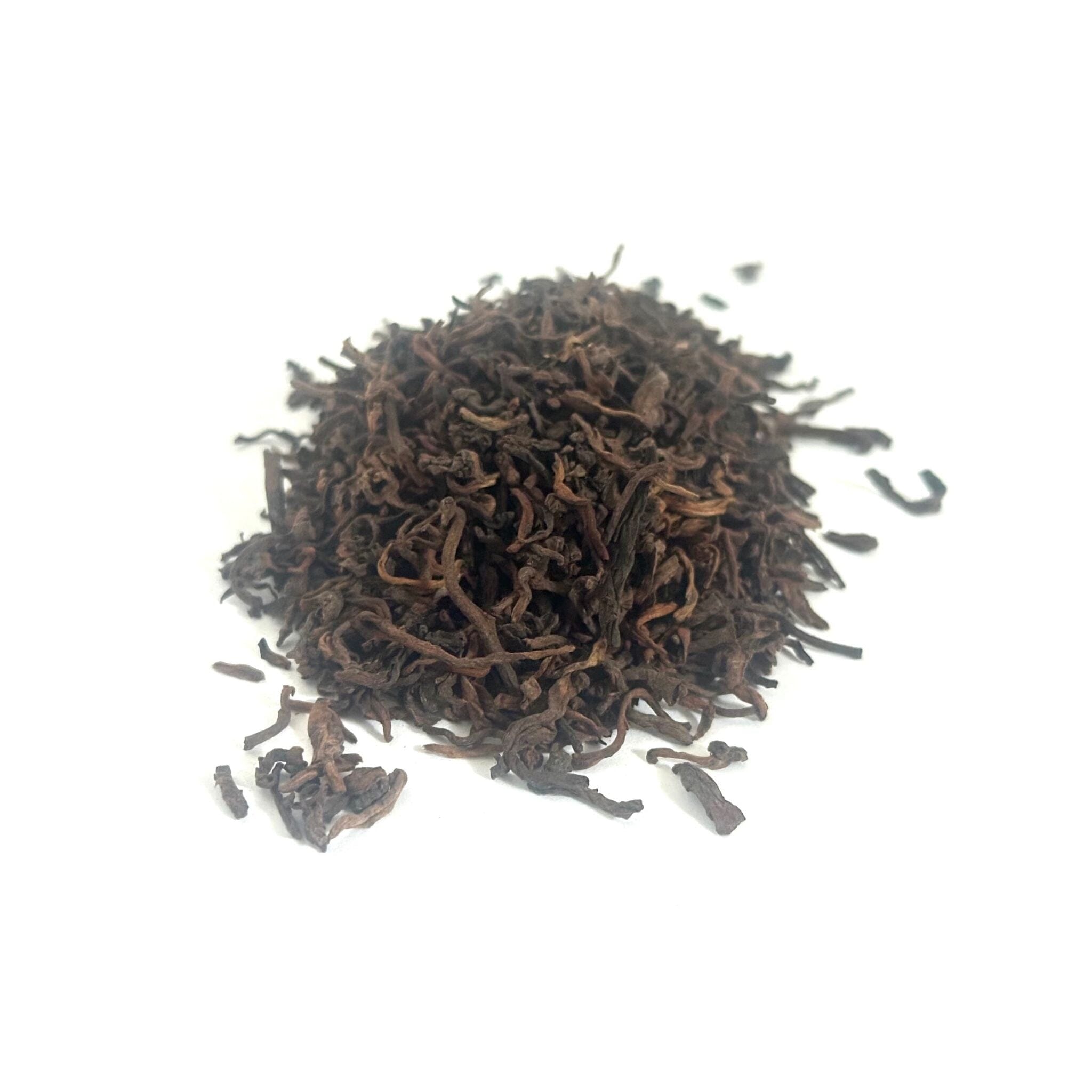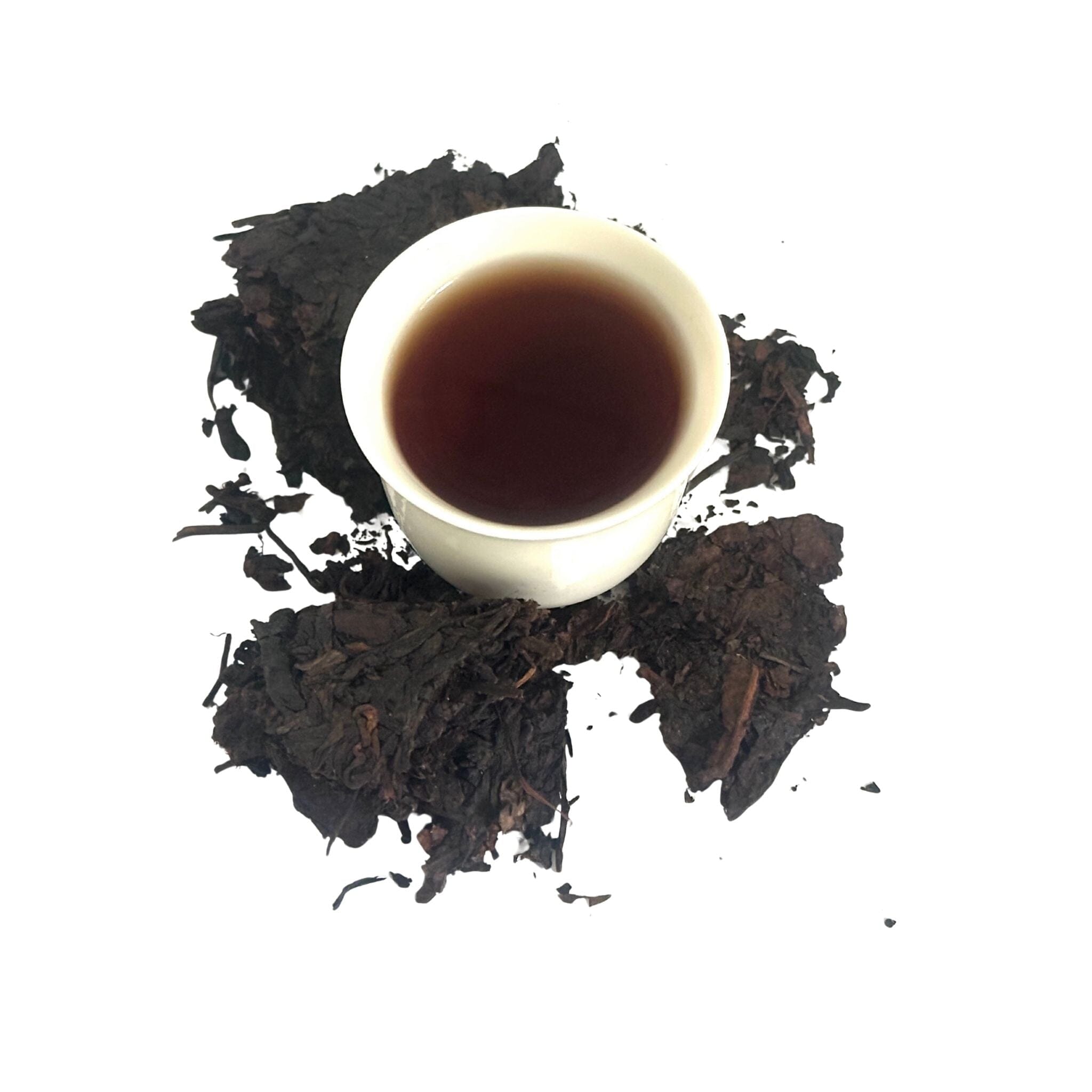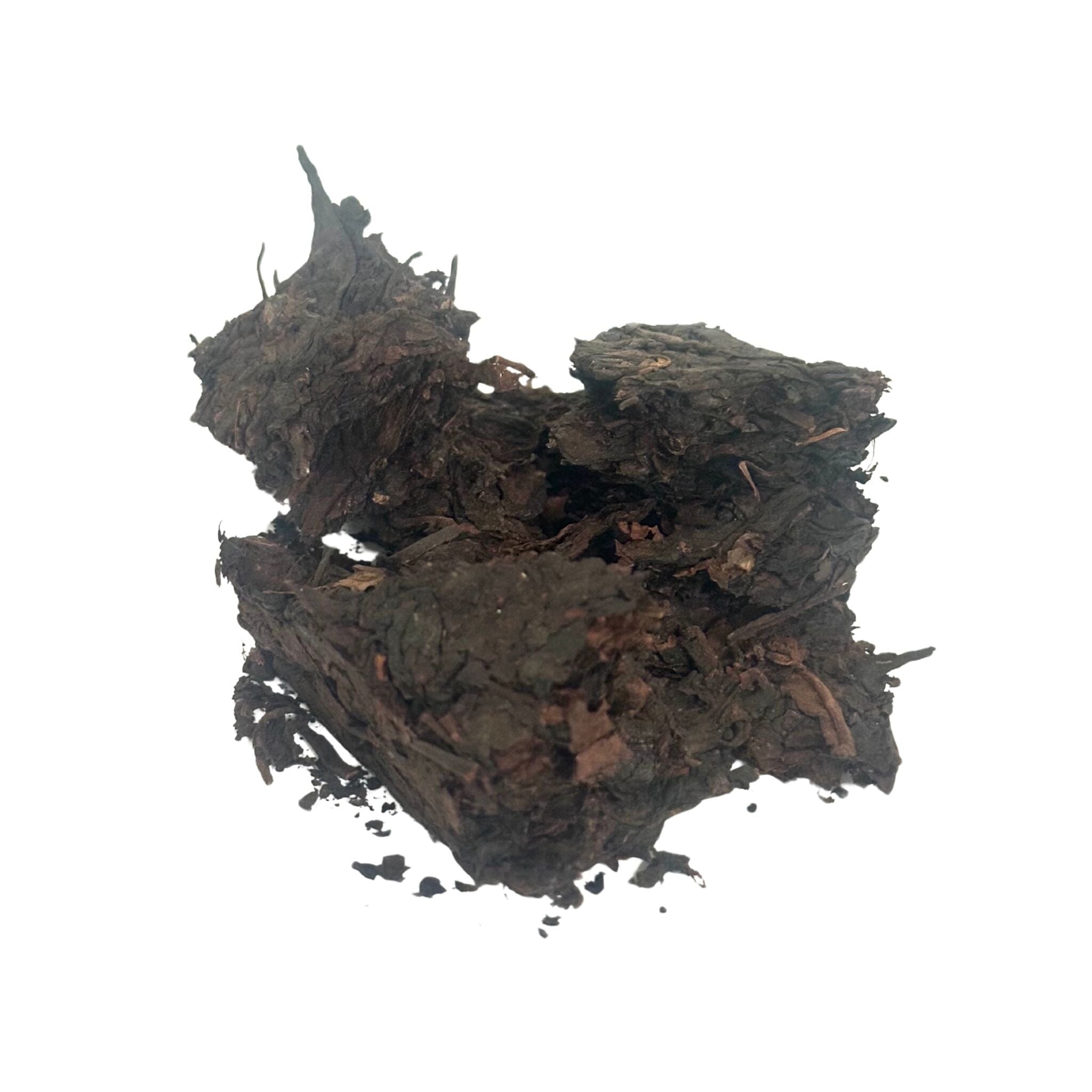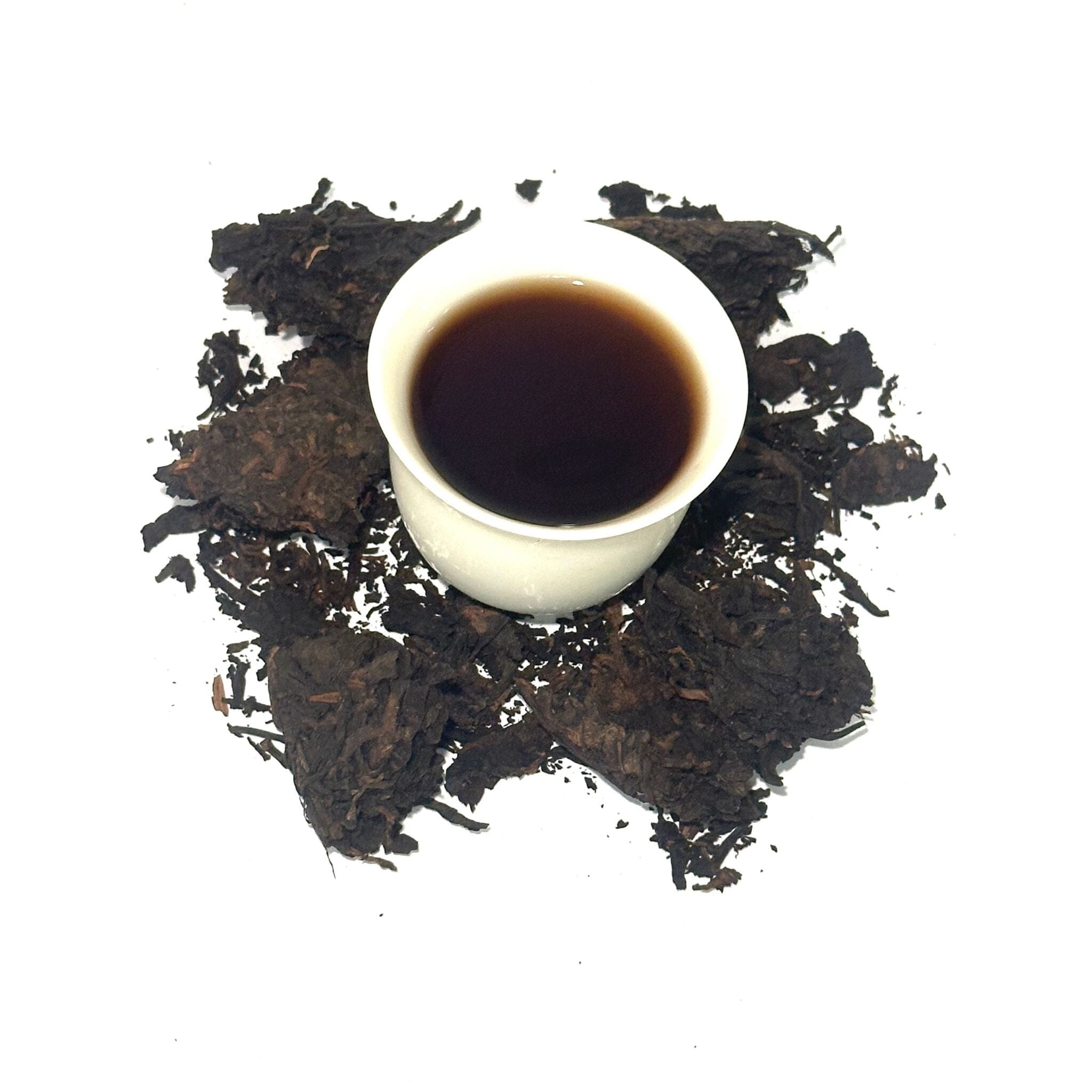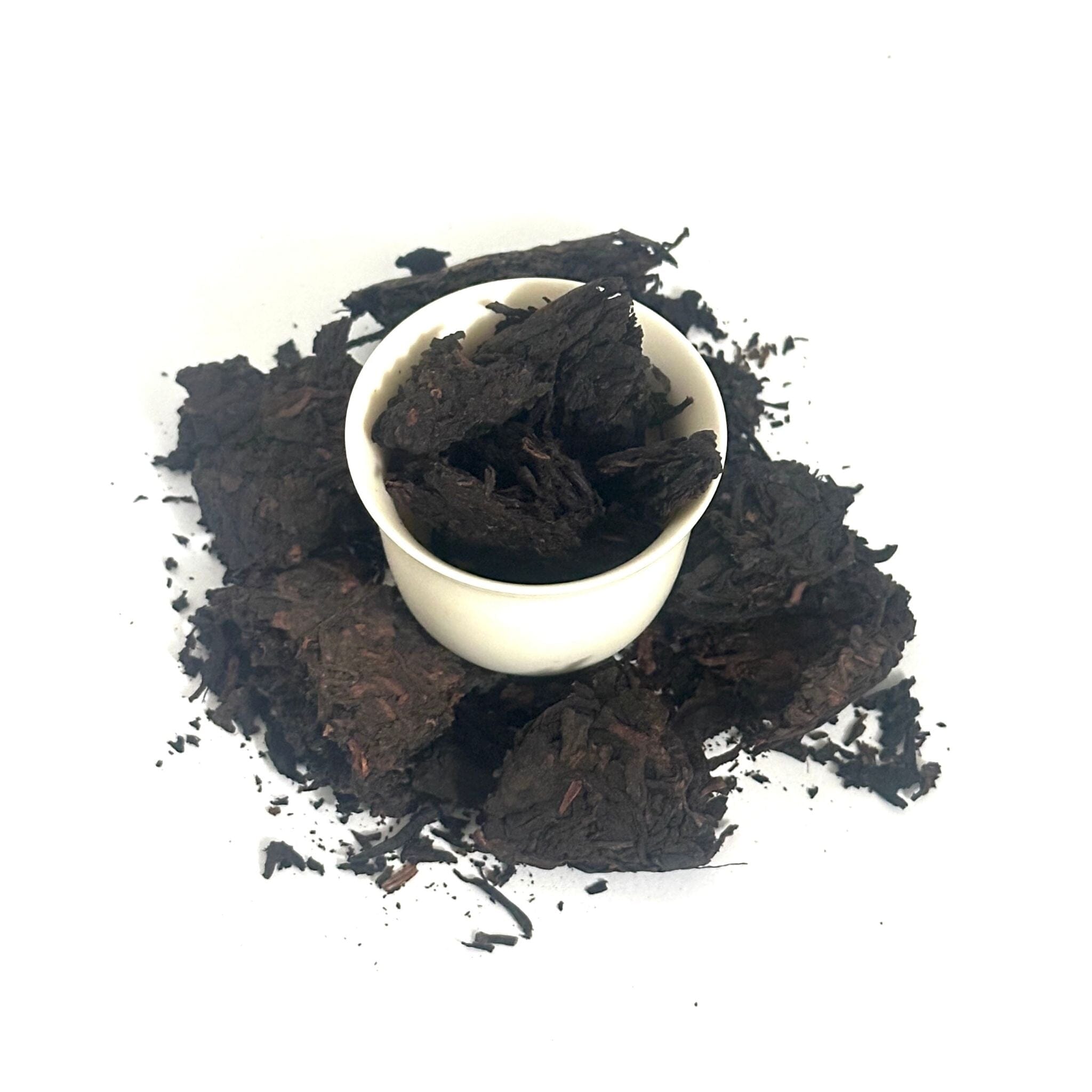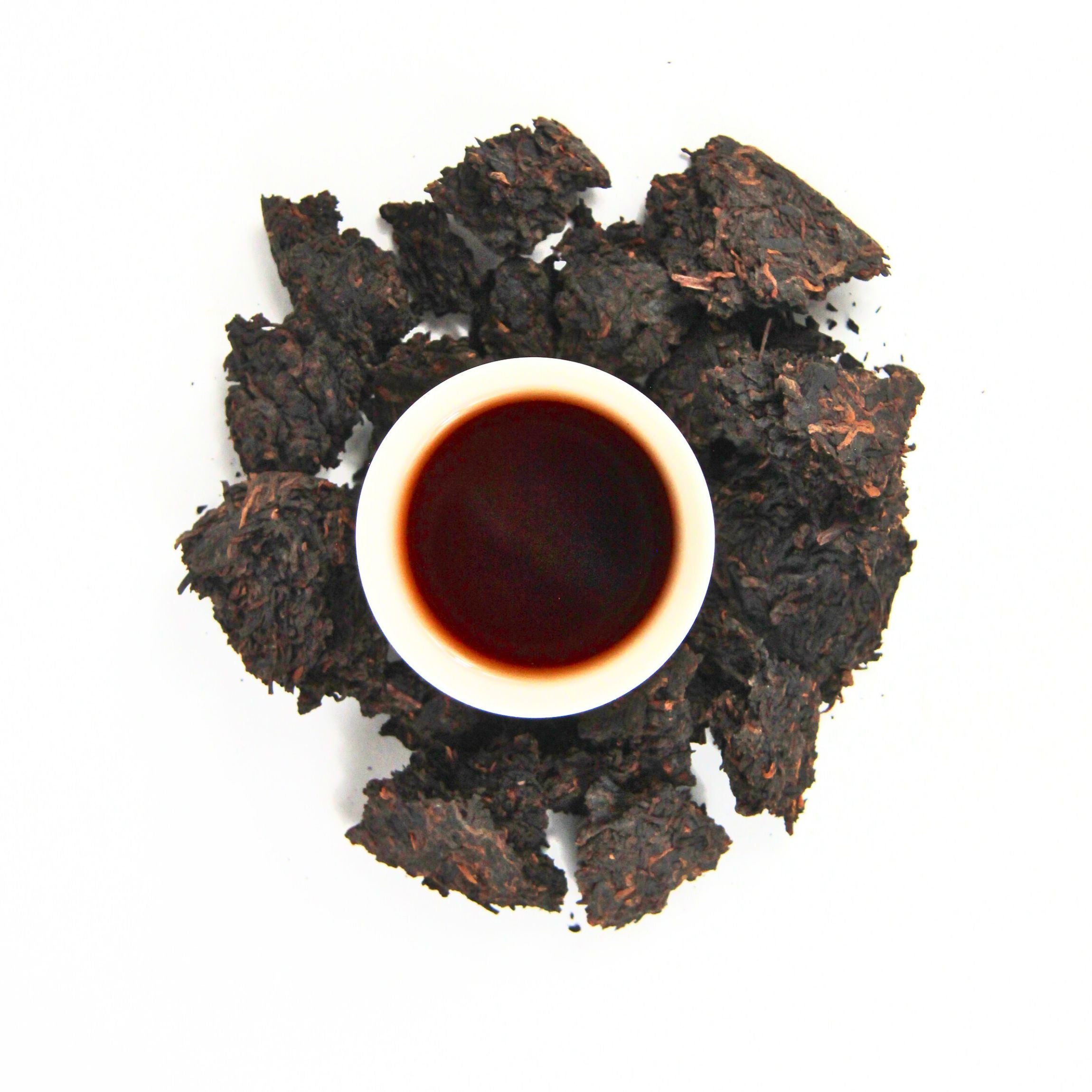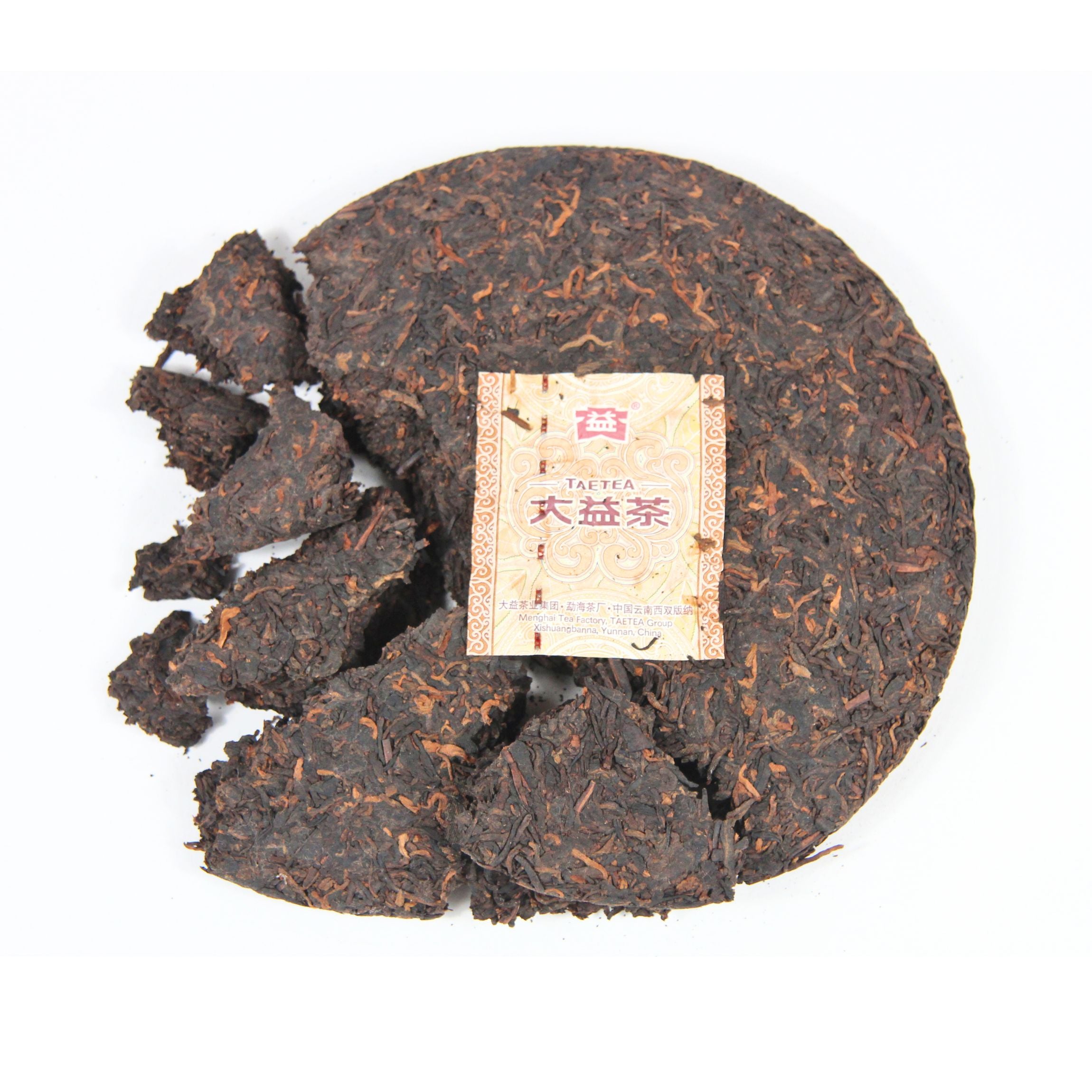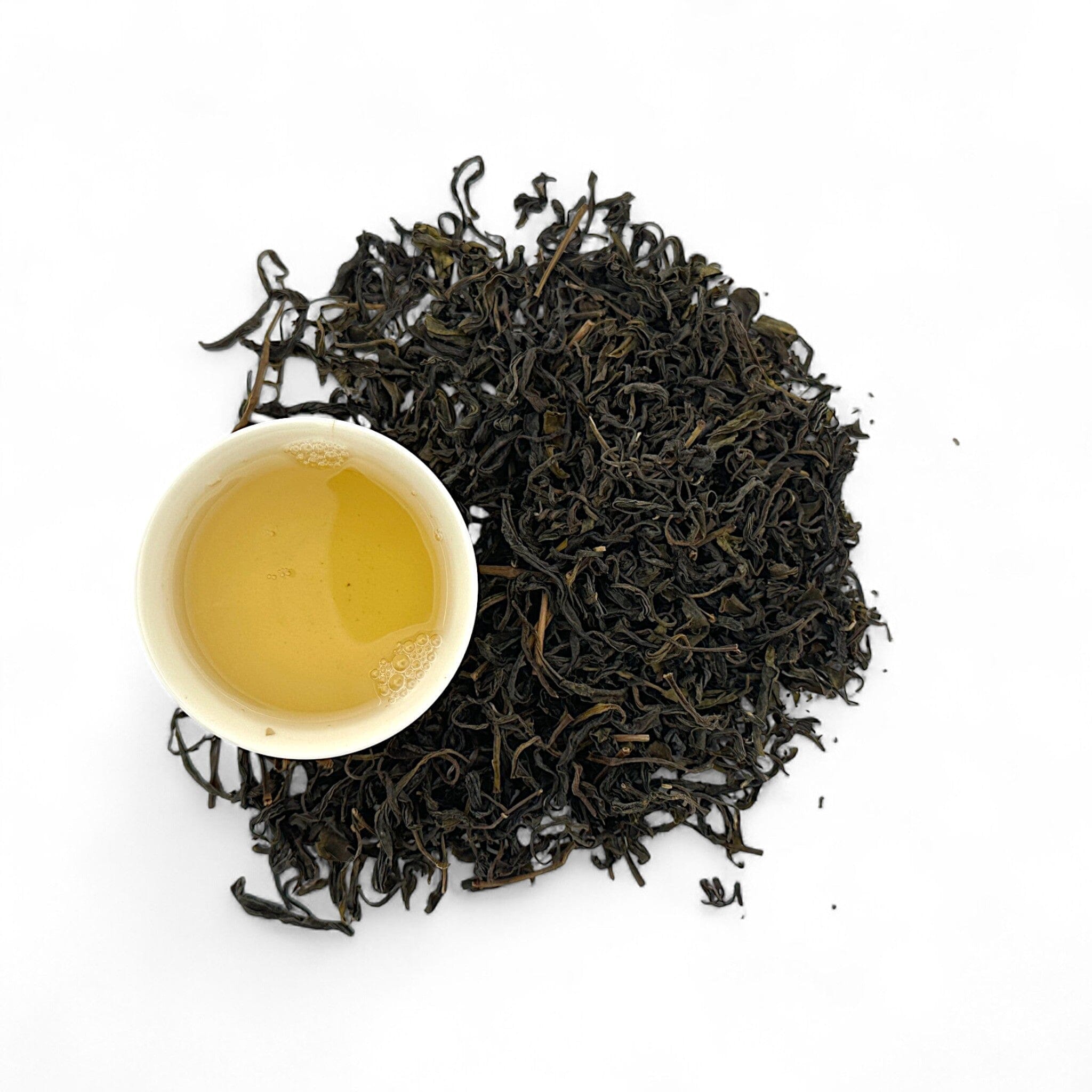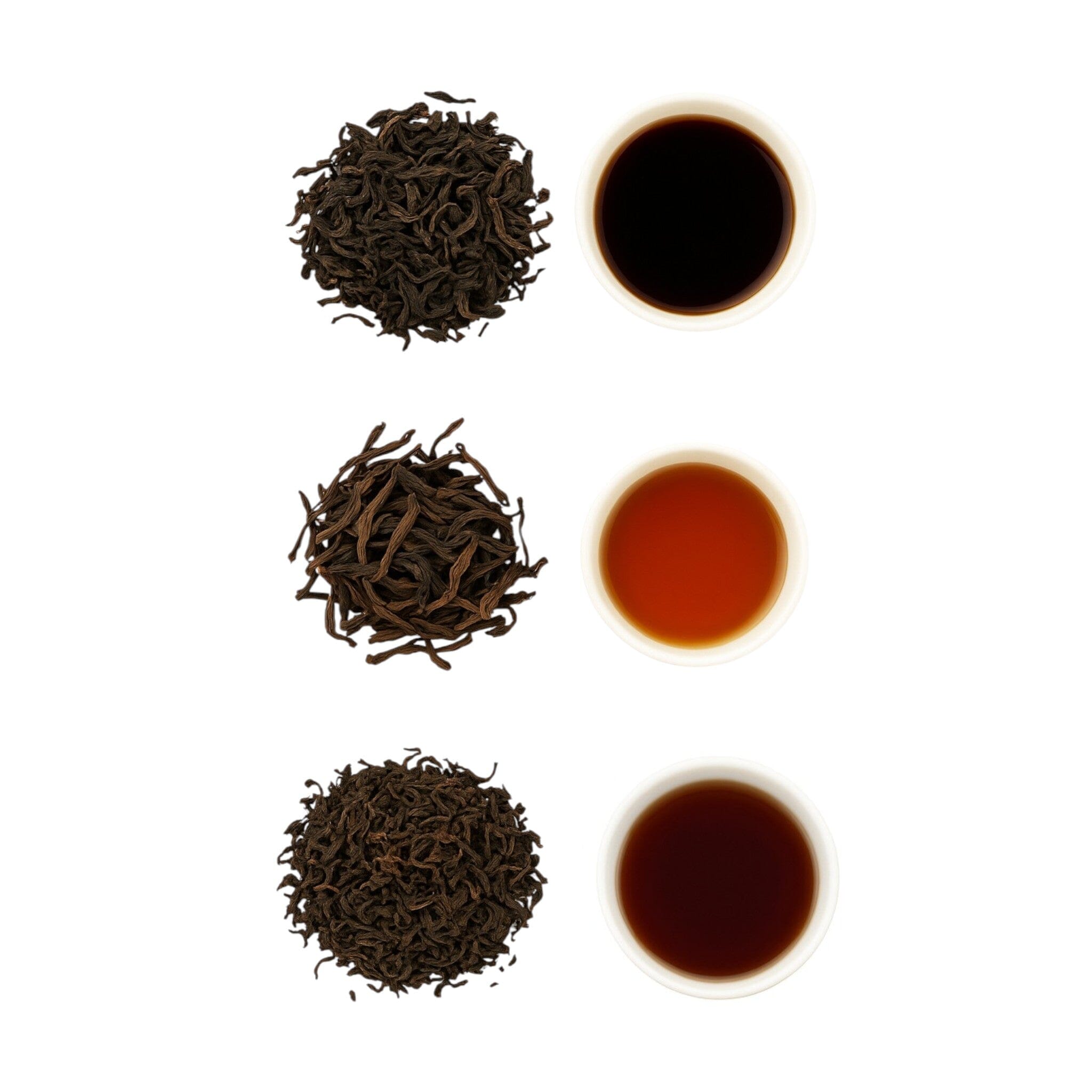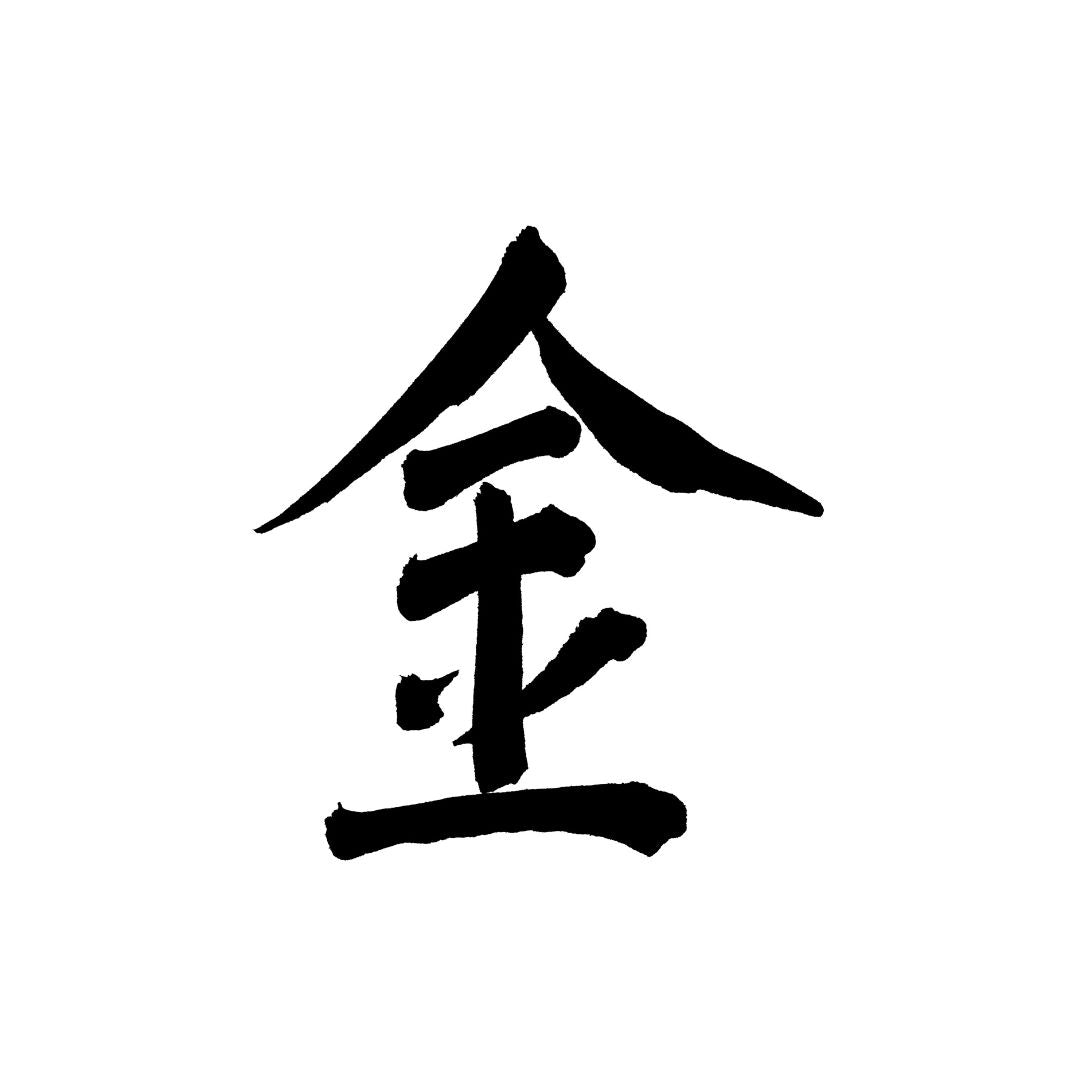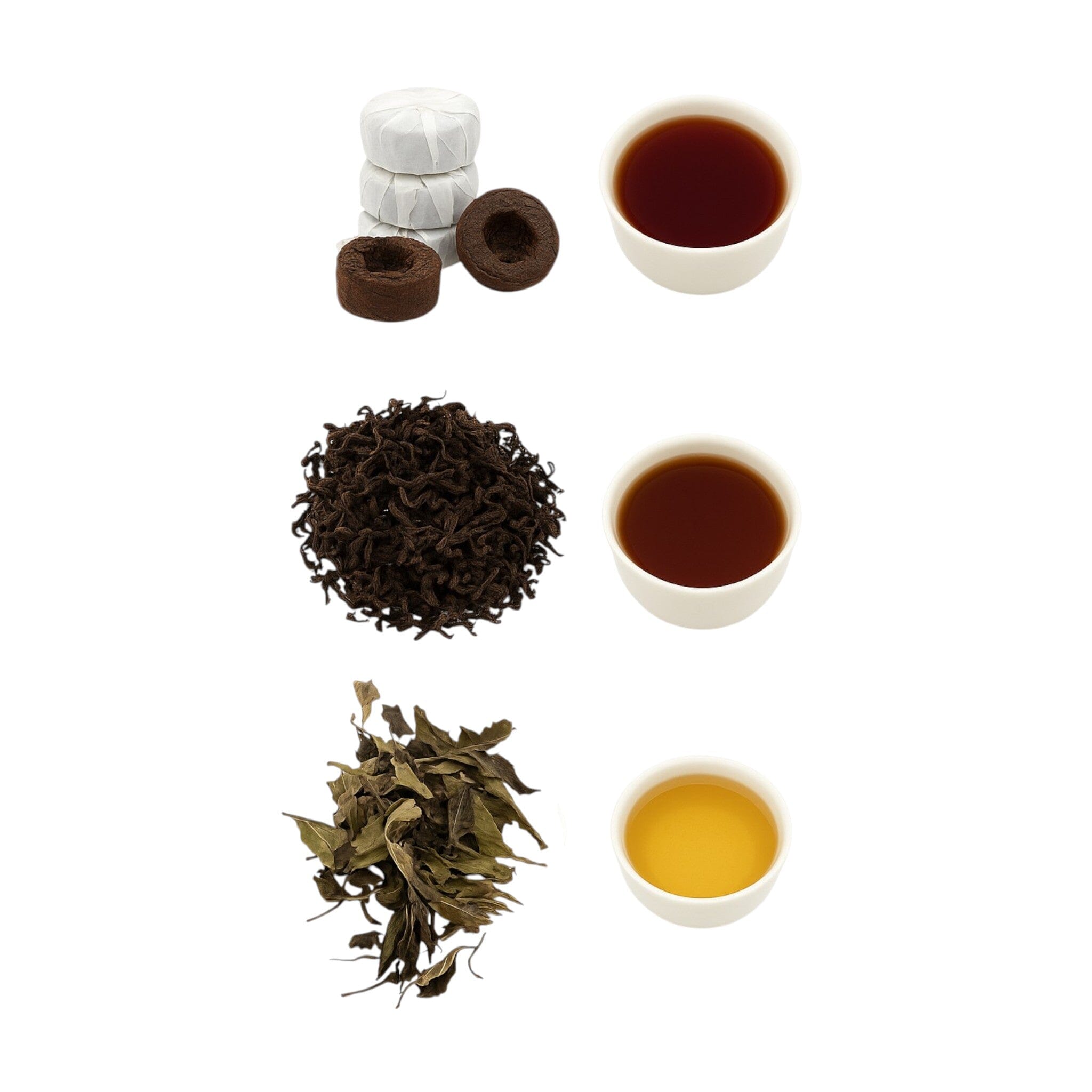Puerh & Liu Bao Tea
Puerh tea is a post-fermented tea that delivers a unique and flavorful tea experience. Classified into two categories, raw (sheng) and cooked/ripe (shou), Puerh undergoes a microbial fermentation process. Explore the naturally aged and fermented Sheng Puerh, or indulge in the robust, earthy flavors and grounding Qi of Shou Puerh.
Liu Bao is true black tea, more similar to fermented puerh tea than what we call black tea in the west, which is actually called red tea in China. Liu Bao is a fermented black tea traditionally from Guangxi Province. It is fermented and dried in a long delicate process in preparation for further aging.
Tea, from the plant Camellia sinensis, is cherished worldwide, not only as a beverage, but also as a healthy elixir for the body, mind and spirit. Camellia sinensis is steeped in rich history and culture. Different varietals of teas have been used as a natural remedy for various ailments for many centuries. But there is one type of tea that stands out for an upset stomach and other digestive ailments, that tea is called pu-erh.
Pu-erh teas have been used by nomadic tribes throughout Asia as a dietary supplement for digestive relief. They would drink the fermented tea before a rich meal to help them metabolize complex fatty foods. This article explores how different varieties of fermented pu-erh teas can provide relief for most digestive issues that cause an upset stomach. Whether it's due to stress, dietary habits, or minor stomach ailments, fermented sheng and shou pu-erh teas can offer soothing and healing relief for the gut.
The Ecology of Living Teas That Benefit the Gut
The bioactive components of each type of tea is greatly based on environmental factors and how the leaves were harvested and processed. These factors can significantly change the chemical makeup and flavor of the tea leaves.
The Yunnan Province of China, is the birthplace of all teas. Old growth tea forests have been preserved here for many centuries. Unlike tea plantations, the tea trees grow wild, within their natural habitat. Collecting beneficial microorganisms like bacteria, fungi, beneficial molds, and other ecological organisms that add to the medicine of tea.
The fermentation process of shou and sheng pu-erh teas started in Yunnan. The benefits of this process starts with the naturally occurring micro ecosystem that old growth tea trees thrive in. Increasing minerals and micro-organisms that support a healthy gut, heart, and other metabolic factors.
The Science Behind Tea's Soothing Properties
Tea in general, contains various compounds that contribute to its health benefits, particularly for digestive health. Polyphenols, for instance, are antioxidants found in tea that can help reduce inflammation in the digestive tract, potentially easing symptoms of discomfort and irritation.
Additionally, pu-erh teas contain specific compounds that stimulate digestion, clears toxins, regulates cholesterol, and balances fat. Teas like shou pu-erh and sheng pu-erh have more recently been studied for their gastrointestinal benefits. Researchers have found that pu-erh teas, because of their fermentation process, can introduce healthy probiotics and gut bacteria that help regulate the gut microbiome. Offering relief from symptoms of irritable bowel syndrome (IBS), liver stagnation, and metabolic diseases.
Difference Between Shou and Sheng Pu-erh Teas
Sheng Pu-erh
Sheng is the process of “raw” tea leaves that are directly compressed into cakes and processed through a slow oxidation process that exposes the leaves to the air. The leaves are fermented for a long period of time between 10 to 50 years. Sheng has a renowned vibrant green taste with complex flavor notes and unique benefits that help heal the gut.
Shou Pu-erh
In the 70’s Sheng Pu-erh teas were in high demand so the Chinese tea industry developed a faster fermentation process for shou pu-erh teas. Shou is the process of “cooked” tea leaves that are first processed in the same way as the sheng variety, but they are exposed to a rapid fermentation process that lasts 45 to 60 days to help speed up the aging process. Shou pu-erh teas are appreciated for their distinct grounding nature and earthy flavor profile that calms the spirit and the gut.
Key Properties Of Fermented Teas That Soothe An Upset Stomach
Benefits the Microbiome
The microorganisms of Living Teas become more alive when the tea is fermented. Offering benefits for the gut microbiome, treating upset stomach and metabolic disorders. As well as, positively impacting immunity, brain function, mood, depression, and anxiety.
Regulates Cholesterol Levels
Pu-erh tea is used in Traditional Chinese Medicine for upset stomach because of the hypocholesterolemic and hypolipidemic effects. Targeting exogenous cholesterol levels in the GI tract to help modulate cholesterol metabolism through the pathways of the liver.
Pu-erh teas specifically help produce a statin called lovastatin that reduces constipation, decreases ldl cholesterol, and increases lipoproteins that help prevent heart disease.
Cleanses Toxins from the Liver
All teas are heavily concentrated in polyphenols which help fight against the negative effects caused by carcinogenic substances, radiation, and toxins. Flushing toxins out of the body quickly so the liver and kidneys don't become overworked. Giving the body a chance to mobilize cell regeneration. Ultimately relieving symptoms like nausea, vomiting, diarrhea, and constipation that cause an upset stomach.
A Natural Anxiolytic
Tea is renowned for its abilities to calm the nervous system which enhances the movement of food through the gastrointestinal tract.The key compound, EGCG, a polyphenol, acts as a natural anxiolytic, relaxing the muscles of the digestive tract, which can alleviate symptoms like bloating, gas, and intestinal cramps. It's particularly beneficial for those suffering from IBS.
Gentle Relief For Inflammation in the GI
Shou and sheng teas are celebrated for their calming effects on the mind and body. It also extends these benefits to the digestive system, soothing the stomach and easing digestive discomfort. Its anti-inflammatory properties can help reduce gastrointestinal inflammation, promoting overall digestive health.
The Magic of Caffeine In tea
Caffeine, present in tea, can have a mild laxative effect, promoting bowel movements and alleviating symptoms of constipation. Caffeine is a magical alkaloid within tea because of its combining effects with other compounds that interact with the body differently than the caffeine in coffee. The caffeine alkaloid in tea acts as a diuretic that fortifies the cardiovascular system and excites the cerebral cortex without over stimulating it.
How To Brew The Perfect Cup Of Soothing Tea
Brewing the perfect cup of tea is both an art and a science. To maximize the digestive benefits, it's important to prepare these teas correctly. Here are some guidelines for brewing the most soothing cup:
Water Temperature
Different teas require different water temperatures to release their beneficial compounds without becoming bitter. Shou pu-erh teas generally require heating water just under a boil at 195-205°F with a steady stream of pearl-sized bubbles that rise to the surface of the water.
Steeping Time
Instead of making a large pot or mug of tea all at once, we enjoy smaller cups of tea, re-steeping the leaves many times. Begin with short steeps, as short as 3-6 seconds, and gradually lengthen the steeping time as you taste the flavors transform. Over-steeping can lead to excessively strong flavors and potential bitterness, particularly in teas with a high tannin content.
Quality Of Tea
Opting for high-quality, organic, Living Teas enhances the health benefits exponentially. Ceremonial grade loose leaf teas that grow in old growth forests provide a more complex flavor and more potent benefits. In comparison, bagged teas or plantation grown teas, can contain smaller, broken leaves, fillers, and pesticides.
Frequency And Timing
Incorporating these teas into your daily routine can help maintain digestive health. Drinking a cup of tea before or after meals can aid digestion, while promoting relaxation and ease.
Integrating Soothing Teas Into Your Daily Routine
Incorporating tea into your daily routine can enhance your digestive health and overall well-being. Here are some tips for seamlessly adding these soothing teas to your day:
- Morning Ritual: Start your day with a cup of red tea or sheng pu-erh tea. These can kickstart your digestion and provide an energizing yet soothing start to the day.
- Post-Meal Digestif: A cup of green, white, or oolong tea after meals can aid in digestion and help prevent bloating or discomfort. These teas serve as a natural and relaxing way to finish any meal.
- Evening Wind-Down: Establishing a nighttime tea routine with a grounding shou pu-erh tea that will promote relaxation and prepare your body for sleep, contributing to better digestive health through stress reduction.
- Hydration Boost: Replacing sugary drinks or excessive caffeine with tea throughout the day can improve hydration levels, which is crucial for healthy digestion.
- Mindful Moments: Use tea time as an opportunity for a mindful break in your day. The act of preparing and enjoying a cup of tea can help facilitate mindfulness and meditation. Provide a moment of calm from the chattering mind, so one can rest in the present moment, focus on their breath, and let go of stress that is stuck in the physical body.
Precautions And Considerations When Using Tea For Digestive Health
While tea can be a beneficial addition to your health regimen, especially for digestive comfort, it's important to approach its use with mindfulness. Here are some key precautions and considerations:
Individual Sensitivities
People can react differently to various teas. The caffeine in tea is generally not as strong as coffee. But it still affects everyone in different ways so finding the right variety of tea that doesn’t aggravate your stomach or nervous system may take some trial and error. We recommend starting a relationship with different teas to learn which ones are best for you.
Pregnancy and Nursing
Tea is generally considered safe during pregnancy in moderate amounts, but it's always best to consult with a healthcare provider to ensure if it is appropriate for you. Those who are trying to avoid caffeine may want to choose different pregnancy safe herbs like ginger, chamomile, or peppermint for their upset stomach.
Medication Interactions
Tea can have minor interactions with medications. Always consult with a healthcare professional before integrating herbal teas into your routine if you are taking medications.
Quality of Tea
Choosing high-quality, organic teas can help minimize exposure to pesticides and ensure the purity of the product. Be wary of tea bags and plantation grown teas that are from an unknown grower or supplier. Living Teas are of the highest quality, that are chemical-free, and sourced from trusted tea families. Each tea we carry has been grown with reverence and precision for many generations.
Listening to Your Body
Pay attention to how your body responds to different teas. If you notice any adverse effects, it's wise to discontinue use and consult with a healthcare provider.
Final Thoughts
Tea is more than a comforting beverage; it's a natural remedy that will help ease an upset stomach and improve digestion. Especially fermented teas like sheng pu-erh and shou pu-erh teas that provide unique benefits. It's important to choose, brew, and incorporate these teas into your routine mindfully, considering your health needs and consulting a doctor if the pain worsens. This careful approach ensures you can safely enjoy the digestive and calming effects of tea. Drinking tea not only supports digestive health but also adds a moment of tranquility to our lives, making it a simple yet effective remedy for stomach discomfort and a step towards overall wellness. So, when your stomach feels off, remember that relief could be just a cup of tea away.
Frequently Asked Questions
Can drinking tea on an empty stomach help with digestion?
Drinking tea on an empty stomach can have varied effects depending on the type of tea and your digestive system. While some find it soothing, others may experience over stimulation. It's best to start with small cups of tea to observe how your body responds.
Is it safe to drink different pu-erh teas for an upset stomach every day?
Yes, pu-erh teas like sheng and shou are safe to consume daily in moderation. However, it's important to listen to your body and consult with a healthcare professional if you have specific health concerns.
Can children drink teas for upset stomachs?
Yes, children can drink small cups of tea. Sheng and shou pu-erh teas are the most gentle and safe in moderate amounts. They won’t be as stimulating as a cup of green or black tea. However, it's crucial to consult with a pediatrician first, especially for children under the age of 2.
How quickly can tea alleviate symptoms of an upset stomach?
The relief time can vary depending on the individual's situation and the type of tea. You may start to feel relief immediately with a shou or sheng pu-erh. Or it can often take 10 to 20 minutes after drinking tea to feel the full effects of the soothing properties.
Are there any teas that should be avoided for an upset stomach?
Teas with high caffeine content, such as black tea or green tea, might exacerbate symptoms of an upset stomach in some people over stimulating the digestive tract. Fermented teas like shou and sheng pu-erh are a more calming option.
Can I add sweeteners to my tea?
While adding a small amount of honey or lemon can enhance the flavor without compromising the benefits, it's best to avoid sugar or artificial sweeteners that can irritate the stomach.
Does the temperature of the tea affect its soothing properties?
Drinking tea at a comfortable, warm temperature is generally more soothing than very hot or iced tea, as extreme temperatures can be harsh on the digestive system.
Can I mix different teas to enhance their benefits?
Yes, depending on how you feel you could experiment by blending different teas. If you need more of a morning brew for an upset stomach you could blend red tea and shou pu-erh tea for a more balanced bowl of tea.
Are there any lifestyle changes that complement the benefits of drinking tea for an upset stomach?
Yes, maintaining a balanced diet, staying hydrated, managing stress, and regular exercise can enhance the digestive benefits of tea.
How can I tell if a specific tea is not suitable for my digestive system?
If you experience increased discomfort, such as bloating, gas, or heartburn, after drinking a specific type of tea, it might not be suitable for you. Listening to your body's response is key.
Sources:
- Khan, N., & Mukhtar, H. (2013). Tea and health: studies in humans. Current Pharmaceutical Design, 19(34), 6141–6147. https://doi.org/10.2174/1381612811319340008
-
Green tea: Health benefits, side effects, and research. (n.d.). Www.medicalnewstoday.com. https://www.medicalnewstoday.com/articles/269538
-
Jia, Wei, et al. “Pu-Erh Tea: A review of a healthful brew.” Journal of Traditional Chinese Medical Sciences, vol. 9, no. 2, Apr. 2022, pp. 95–99, https://doi.org/10.1016/j.jtcms.2022.04.005.
Gascoyne, Kevin, et al. Tea: History, Terroirs, Varieties. Firefly Books, 2018.

